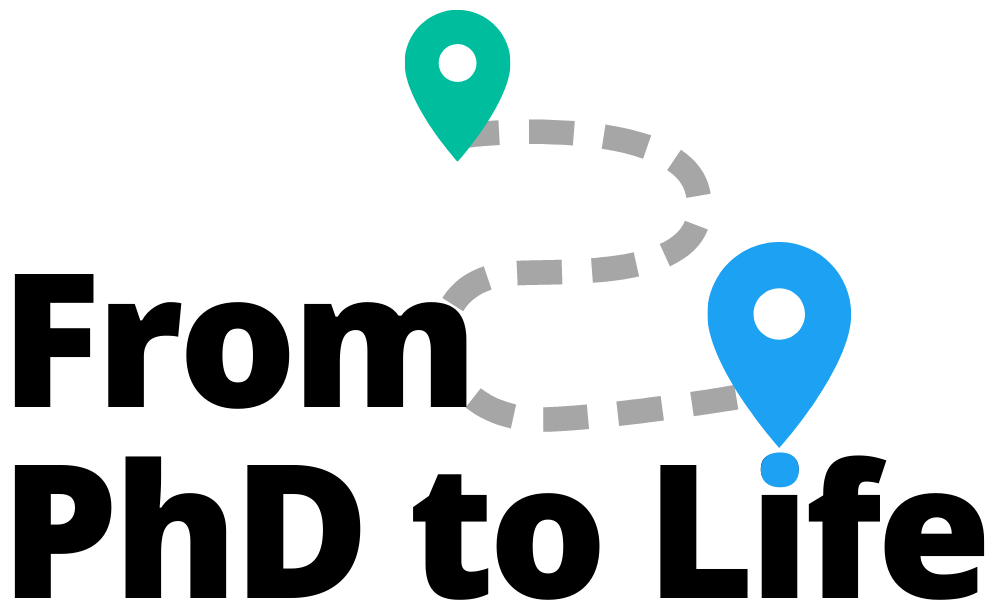
From PhD to Life
Meaningful Careers for PhDs

Recommended Reading

Note: As an Amazon Associate, I earn from qualifying purchases. In other words, I may earn a small commission if you click on a link on this page to purchase a book from Amazon.
This list is aimed at graduate students, postdocs, and other PhDs who are actively looking for paid employment or exploring career options. It includes both practical resources, books that combine advice with inspiration, ones that hope to advocate for better systems while also breaking things down for job seekers, as well as memoirs and novels. The focus here is on books written for graduate students and PhDs, but I’ve also included what I think as key or otherwise useful texts with a much broader intended audience.
What’s not on this list? Books that focus almost exclusively on graduate school itself are generally omitted (exception: Berdahl and Malloy, for its framing of the whole thing as part of your career). There are great ones in this category, including Jessica McCrory Calarco’s A Field Guide to Grad School , Malika Grayson’s Hooded: A Black Girl’s Guide to the Ph.D. , Robert L. Peters’s Getting What You Came For and Adam Ruben’s Surviving Your Stupid, Stupid Decision to go to Grad School . See also Gavin Brown’s How to Get Your PhD: A Handbook for the Journey , which features an essay by me! Similarly, books that focus on academic careers (once you’ve got one) aren’t included (example: Timothy M. Sibbald and Victoria Handford, eds., The Academic Gateway ), nor are books that focus on navigating a career beyond the ivory tower. There are lots of books about academic writing and publishing, conducting and producing research, doing a dissertation, and related stuff. These aren’t included either.
Something missing? I occasionally update this list, so let me know what you think I should add or change.
Books for PhDs
This list is in alphabetical order by author’s last name. Some of these books are inexpensive; others are not. Most should be available via your university or local library, or even from your institution’s career services centre.
Fawzi Abou-Chahine, A Jobseeker’s Diary: Unlocking Employment Secrets (2021).
The short guide is directly aimed at PhDs, especially folks from STEM disciplines. Folks in the UK seeking roles in the private sector will certainly benefit from this book.
Susan Basalla and Maggie Debelius, “ So What Are You Going to Do with That?” Finding Careers Outside Academia (3rd ed., 2014)
The best guide to figuring out your life post-PhD written by two humanities doctorates who’ve been there, done that. Includes many profiles of fellow (former) academics who’ve transitioned to careers beyond the tenure-track.
Loleen Berdahl and Jonathan Mallow, Work Your Career: Get What You Want from Your Social Sciences or Humanities PhD (2018).
I loved the authors’ emphasis on getting clear about what you want, and the advice to reflect at each stage of the graduate school process whether continuing on is the right one. It is refreshing to read a book on graduate school that neither presumes academia is the desired career outcome nor implies it ought to be. Instead, the authors encourage readers to keep their options open and rightly point out the benefits of varied work experience, training, and professionalism to careers within and beyond the Ivory Tower.
Natalia Bielczyk, What Is Out There for Me? The Landscape of Post-PhD Career Tracks (2nd ed., 2020).
A Europe-based computational scientist turned entrepreneur, Dr. Bielczyk offers an important perspective on PhD careers, one explicitly aimed at STEM folks. The book benefits from Bileczyk’s personal experiences, extensive research — including interviews with dozens of PhDs — and includes lots of specific advice and suggestions. You can subscribe to her YouTube channel and interact with her on social media.
Jenny Blake, Pivot: The Only Move That Matters Is Your Next One (2017)
From the description: “ What’s next? is a question we all have to ask and answer more frequently in an economy where the average job tenure is only four years, roles change constantly even within that time, and smart, motivated people find themselves hitting professional plateaus. But how do you evaluate options and move forward without getting stuck?”
Richard N. Bolles with Katharine Brooks, What Color is Your Parachute? 2021 : Your Guide to a Lifetime of Meaningful Work and Career Success (50th anniv. ed, 2020)
If you read only one book on how to get a job and change careers, make it this one. Bolles has an idiosyncratic writing style but his advice is spot-on. Read my review of the 2019 version here .
The 2021 edition was thoroughly updated by Katharine Brooks, EdD, who is the author of You Majored in What? (below). Great choice! An excellent way to bring a classic up to date, and at a time when good advice and guidance is particularly needed.
William Bridges, Transitions: Making Sense of Life’s Changes (40th anniv. ed., 2019)
Think you’re taking too long figuring out what’s next? You aren’t! In the pre-modern world, the transition—a psychological process as opposed to simply a change—was understood as a crucial part of life; not so nowadays. But to successfully navigate a transition, an individual has to experience an end, go through a period of nothingness or neutrality, and finally make a new beginning. No part of the process can be skipped or sped through. There are no shortcuts. (Bridges can relate to being post-PhD or on the alt-ac track: He’s got an ivy league PhD and was an English professor until going through an important transition of his own.)
Katharine Brooks, You Majored in What? Designing Your Path from College to Career (updated, 2017)
Dr. Brooks is a long-time career educator who (as of 2020) directs the career center at Vanderbilt University. This book is aimed at a broader audience of students, but don’t let that dissuade you from checking it out. Starting from the assumption that there are plenty of useful clues in what you’ve done and who you are, and filled with great exercises to help you parse them out, the book will take you through the career exploration process and set you up for a successful job search that is based on a sound understanding of what you want to do and how to make a strong case to employers.
Bill Burnett and Dave Evans, Designing Your Life: How to Build a Well-lived, Joyful Life (2016)
From the description: “In this book, Bill Burnett and Dave Evans show us how design thinking can help us create a life that is both meaningful and fulfilling, regardless of who or where we are, what we do or have done for a living, or how young or old we are. The same design thinking responsible for amazing technology, products, and spaces can be used to design and build your career and your life, a life of fulfillment and joy, constantly creative and productive, one that always holds the possibility of surprise.”
Christopher L. Caterine, Leaving Academia: A Practical Guide (2020)
Just published. Dr. Caterine is a classics PhD who transitioned into a career in strategic corporate communications. One thing that’s cool about this book is just that: He’s working in the private sector. Humanities PhDs are much less commonly found in the business world compared to academics with other backgrounds, and I think that’s a shame. Chris shows us it’s possible and how you can do it too. (But it’s fine if you’re looking elsewhere.)
Christopher Cornthwaite, Doctoring: Building a Life With a PhD (2020)
Dr. Cornthwaite is the Canadian religious studies PhD behind the blog and online community called Roostervane . He shares his story in hopes of inspiring those struggling to move forward with hope and strategies to build a career. Check out the online community too, useful for folks searching for non-academic positions as well as individuals launching side hustles or businesses as consultants of various kinds.
Leon F. Garcia Corona and Kathleen Wiens, eds., Voices of the Field: Pathways in Public Ethnomusicology (2021)
A friend of mine contributed a chapter to this. From the description: “These essays capture years of experience of fourteen scholars who have simultaneously navigated the worlds within and outside of academia, sharing valuable lessons often missing in ethnomusicological training. Power and organizational structures, marketing, content management and production are among the themes explored as an extension and re-evaluation of what constitutes the field of/in ethnomusicology. Many of the authors in this volume share how to successfully acquire funding for a project, while others illustrate how to navigate non-academic workplaces, and yet others share perspectives on reconciling business-like mindsets with humanistic goals.”
M.P. Fedunkiw, A Degree in Futility (2014)
I started to read this novel one day and just couldn’t stop until I finished. So many feelings! The main character defends her dissertation (history of science, U of T) at the beginning of the book, and the story ends a few years later. Fedunkiw has drawn on her own post-PhD experiences to write this wonderful book about a group of three friends navigating life, love, and work in and out of academia. Do read it.
Joseph Fruscione and Kelly J. Baker, eds., Succeeding Outside the Academy: Career Paths beyond the Humanities, Social Sciences, and STEM (2018)
Edited volume of contributions, primarily from women in humanities and social science fields. From the description: “Their accounts afford readers a firsthand view of what it takes to transition from professor to professional. They also give plenty of practical advice, along with hard-won insights into what making a move beyond the academy might entail—emotionally, intellectually, and, not least, financially. Imparting what they wish they’d known during their PhDs, these writers aim to spare those who follow in their uncertain footsteps. Together their essays point the way out of the ‘tenure track or bust’ mindset and toward a world of different but no less rewarding possibilities.”
Patrick Gallagher and Ashleigh Gallagher, The Portable PhD: Taking Your Psychology Career Beyond Academia (2020)
From the description: “Each chapter in this book offers tips and key terms for navigating various kinds of employment, as well as simple action steps for communicating your talents to hiring managers. Your ability to conduct research, to understand statistics and perform data analysis, and to perform technical or scientific writing are all highly valuable skills, as are the insights into human nature you’ve gained from your psychology studies, and your ability to think innovatively and work cooperatively in a variety of contexts.”
David M. Giltner, Turning Science into Things People Need (2017)
From the description: “In this book, ten respected scientists who have built successful careers in industry reveal new insights into how they made the transition from research scientist to industrial scientist or successful entrepreneur, serving as a guide to other scientists seeking to pursue a similar path. From the student preparing to transition into work in industry, to the scientist who is already working for a company, this book will show you how to sell your strengths and lead confidently.”
Alyssa Harad, Coming to My Senses: A Story of Perfume, Pleasure, and an Unlikely Bride (2012).
An English PhDs lovely memoir of discovering the wonders of perfume and embracing who she really is. A story of how one intellectual got back in touch with her feelings, a crucial step on the road to post-PhD happiness and fulfillment. Read an excerpt over at the Chronicle .
Leanne M. Horinko, Jordan M. Reed, James M. Van Wyck, The Reimagined PhD: Navigating 21st Century Humanities Education (2021).
This text appeals to both individual PhDs and graduate students figuring out their own pathway forward and faculty members and other university staff working to improve programs and professional development offerings at their campuses. I’m glad to see it out! (I was at the 2016 conference that inspired this book.)
Hillary Hutchinson and Mary Beth Averill, Scaling the Ivory Tower: Your Academic Job Search Workbook (2019)
Two long-time academic coaches wrote this fantastic guide and workbook for the academic job market. They take you step-by-step through the process of understanding how hiring works — and how it works differently for specific types of positions and kinds of institutions, getting sorted for your search, where to find job ads and other crucial information, staying organized, creating all your materials, prepping for interviews, and other considerations. The book also takes a clear-eyed view of academia and it’s challenges for job seekers, both in the US and around the world. This book is an essential companion to your academic job search. Buying the e-book version? Download and print the worksheets here .
Natalie Jackson, ed., Non-Academic Careers for Quantitative Social Scientists: A Practical Guide to Maximizing Your Skills and Opportunitie s (2023).
If you’re at an institution, check to see if you have free access to this ebook via Springer.
Kaaren Janssen and Richard Sever, eds., Career Options for Biomedical Scientists (2014).
From the description: “This book plugs the gap by providing information about a wide variety of different careers that individuals with a PhD in the life sciences can pursue. Covering everything from science writing and grant administration to patent law and management consultancy, the book includes firsthand accounts of what the jobs are like, the skills required, and advice on how to get a foot in the door. It will be a valuable resource for all life scientists considering their career options and laboratory heads who want to give career advice to their students and postdocs.”
Karen Kelsky, The Professor Is In: The Essential Guide to Turning Your Ph.D. Into A Job (2015)
Dr. Kelsky is dedicated to telling the truth about the academic job market. This book expands on and collects in one place her huge archive of advice and information for PhDs — particularly those aiming for tenure-track positions at US universities. There is advice and resources for “leaving the cult” (part X), a section heading that gives you a sense of where she’s coming from! Academic is its own beast, and its idiosyncracies and unwritten, untold norms and rules belie claims of meritocracy. If you’re going to aim for a tenure-track position, make sure you know what you’re going into and how to increase your chances of success where positions are scarce.
Peggy Klaus, Brag: The Art of Tooting Your Own Horn without Blowing It (2004)
In my experience, PhDs are excellent at not tooting their own horns, for lots of reasons, good and less-good. Here’s how you can talk about yourself appropriately in hopes of moving forward in your career. Great book.
Kathryn E. Linder, Kevin Kelly, and Thomas J. Tobin, Going Alt-Ac: A Guide to Alternative Academic Careers (2020).
If you’re doing or have a doctorate and want to be meaningfully employed in or around higher education, you must read this book – and do what it says. It’s full of clear, practical advice and example jobs where PhDs excel. I was impressed with the depth of knowledge and wide-ranging, thoughtful advice presented, useful for career explorers and seasoned professionals both (and everyone in between). It it’s been a while since you’ve taken a long, hard look at your professional situation, this book will help you revisit your goals and provide smart strategies to move your career forward in just the right way for you.
Kathleen Miller et al. (eds), Moving On: Essays on the Aftermath of Leaving Academia (2014)
Featuring an essay by your truly and many other contributions. By the women behind the now-defunct site How to Leave Academia.
Rachel Neff, Chasing Chickens: When Life after Higher Education Doesn’t Go the Way You Planned (2019)
From the description: “So, you have your PhD, the academic world’s your oyster, but teaching jobs, it turns out, are as rare as pearls. Take it from someone who’s been there: your disappointment, approached from a different angle, becomes opportunity. Marshaling hard-earned wisdom tempered with a gentle wit, Rachel Neff brings her own experiences to bear on the problems facing so many frustrated exiles from the groves of academe: how to turn ‘This wasn’t the plan!’ into ‘Why not?'”
M. R. Nelson, Navigating the Path to Industry: A Hiring Manager’s Advice for Academics Looking for a Job in Industry (2014)
Melanie Nelson’s useful guide is aimed at STEM PhDs who already know where they’re headed. She earned a PhD in the biosciences and has worked as a hiring manager in industry for over a decade.
Rebecca Peabody, The Unruly PhD: Doubts, Detours, Departures, and Other Success Stories (2014)
A collection of first-hand accounts and interviews with people who’ve travelled in, through, and beyond graduate school. Read my review here .
Katie Rose Guest Pryal, The Freelance Academic: Transform Your Creative Life and Career (2019).
Read this book! Katie Pryal provides helpful advice for getting started with the practical stuff, as well as grounding yourself in the reality of the gig economy. It’s particularly good for arts and humanities PhDs and similar academically-focused folks who think business isn’t for them. Take it from Dr. Pryal (and me): You can do this.
Tom Rath, StrengthsFinder 2.0: Discover Your CliftonStrengths (2017)
Take this one out of your local library to read the descriptions and learn about the concept of (work) strengths. If you want to take the assessment, you can purchase the book outright or do that on Gallup’s website . If you’re newer to the world of work beyond the academy, this book and the description of strengths will give you all kinds of useful words and phrases to use to understand what you enjoy, what you bring to a workplace, and effectively communicate all that to potential employers and professional colleagues. Embracing strengths will give you a positive, forward-looking way of approaching career building, and it can change your life for the better.
Katine L. Rogers, Putting the Humanities PhD to Work: Thriving in and beyond the Classroom (2020)
From the introduction: “This book invites readers to consider ways that humanities graduate training can open unexpected doors that lead to meaningful careers with significant public impact, while also suggesting that an expanded understanding of scholarly success can foster more equitable and inclusive systems in and around the academy.” Good. Do read this one if you’re currently a student or if your work has anything to do with advising students or creating and maintaining the graduate training ecosystem within and beyond institutions.
Martin E. P. Seligman, Flourish: A Visionary New Understanding of Happiness and Well-being (2011)
An update to his bestselling book Authentic Happiness (also worth reading), this introduced me to the concept of PERMA: that to flourish in life and work, you need to consider and evaluate how frequently you experience have positive emotions (P), feel engaged (E), have positive relationships (R), feel what you’re doing is meaningful (M), and have a sense of accomplishment (A). This isn’t about careers specifically, but it might help you reframe what counts as success in your work life, and that’s particularly crucial for career changers.
Melanie V. Sinche, Next Gen PhD: A Guide to Career Paths in Science (2016)
From the description: “Next Gen PhD provides a frank and up-to-date assessment of the current career landscape facing science PhDs. Nonfaculty careers once considered Plan B are now preferred by the majority of degree holders, says Melanie Sinche. An upper-level science degree is a prized asset in the eyes of many employers, and a majority of science PhDs build rewarding careers both inside and outside the university. A certified career counselor with extensive experience working with graduate students and postdocs, Sinche offers step-by-step guidance through the career development process: identifying personal strengths and interests, building work experience and effective networks, assembling job applications, and learning tactics for interviewing and negotiating—all the essentials for making a successful career transition.”
Don. J. Snyder, The Cliff Walk: A Memoir of a Job Lost and a Life Found (1998)
A marvelous memoir written by a former tenure-track professor at Colgate University who was suddenly let go. This is the story of his journey through unemployment. You will relate. What’s neat is to look up what he does now — but do read the book before you do! I quote from the book in this post .
Matteo Tardelli, Beyond Academia: Stories and Strategies for PhDs Making the Leap to Industry (2023)
This book takes readers through a 4-step process to reflect on what they want, explore job options, apply for roles, and conduct job interviews and negotiate offers. This is Dr. Tardelli’s second book for PhDs moving to non-academic careers; his first one is partly a memoir about his own journey: The Salmon Leap for PhDs (2020).
Anna Marie Trester, Bringing Linguistics to Work: A Story Listening, Story Finding, and Story Telling Approach to Your Career (2017)
My friend and colleagues Dr. Anna Marie Trester is the expert on careers for linguists, and more broadly is a great resource for thinking creatively and expansively about the value of your social sciences and humanities education to the wider world of work and career development. Check out her website for more offerings, CareerLinguist.com .
Jennifer Brown Urban and Miriam R. Linver, eds., Building a Career Outside Academia: A Guide for Doctoral Students in the Behavioral and Social Sciences (2019)
From the description: “This career guide examines the rewarding opportunities that await social and behavioral science doctorates in nonacademic sectors, including government, consulting, think tanks, for-profit corporations, and nonprofit associations. Chapters offers tips for leveraging support from mentors, conducting job searches, marketing your degree and skill set, networking, and preparing for interviews. This expert guidance will help you decide what career is the best fit for you.”
Julia Miller Vick, Jennifer S. Furlong, and Rosanne Lurie, The Academic Job Search Handbook (5th ed., 2016)
Pick this one up for trustworthy job market advice and info — the first edition was published in 1992! — and the dozens of sample cover letters, CVs, and statements of various kinds. It covers an array of fields, from professionally-oriented doctorates to STEM and humanities. This book is a beast, and might be overwhelming. Tackle it bit by bit and keep it as a reference as you gear up for the job market, prepare and submit applications, and move along the hiring process toward negotiation and acceptance.
Susan Britton Whitcomb, Resume Magic: Trade Secrets of a Professional Resume Writer (4th ed., 2010)
This was the book I found most useful when I was researching how to write a good resume (as opposed to an academic CV).
LET US HELP
Welcome to Capella
Select your program and we'll help guide you through important information as you prepare for the application process.
FIND YOUR PROGRAM
Connect with us
A team of dedicated enrollment counselors is standing by, ready to answer your questions and help you get started.

- Capella University Blog
- PhD/Doctorate
5 must-reads for doctoral students
January 11, 2016
The decision to pursue a doctoral degree can be exciting and scary at the same time.
Good preparation will ease the path to writing a great dissertation. Reading some expert guide books will expand your knowledge and pave the way for the rigorous work ahead.
Capella University faculty, doctoral students, and alumni recommend these five books for doctoral students in any discipline.
1. How to Read a Book: The Classic Guide to Intelligent Reading by Mortimer J. Adler
âOne book fundamental to my doctoral education that my mentor had my entire cohort read, and which I still recommend to this day, is How To Read a Book , which discusses different reading practices and different strategies for processing and retaining information from a variety of texts.â â Michael Franklin, PhD, Senior Dissertation Advisor, Capella School of Public Service and Education.
Originally published in 1940, and with half a million copies in print, How to Read a Book is the most successful guide to reading comprehension and a Capella favorite. The book introduces the various levels of reading and how to achieve themâincluding elementary reading, systematic skimming, inspectional reading, and speed-reading.
Adler also includes instructions on different techniques that work best for reading particular genres, such as practical books, imaginative literature, plays, poetry, history, science and mathematics, philosophy, and social science works.
2. Dissertations and Theses from Start to Finish by John D. Cone, PhD and Sharon L. Foster, PhD
This book discusses the practical, logistical, and emotional stages of research and writing. The authors encourage students to dive deeper into defining topics, selecting faculty advisers, scheduling time to accommodate the project, and conducting research.
In clear language, the authors offer their advice, answer questions, and break down the overwhelming task of long-form writing into a series of steps.
3. Writing Your Dissertation in 15 Minutes a Day by Joan Balker
This book is recommended for its tips on compartmentalizing a large project into actionable items, which can be helpful when working on a project as mammoth as a dissertation. Balker connects with the failure and frustration of writing (as she failed her first attempt at her doctorate), and gives encouragement to students who encounter the fear of a blank page.
She reminds dissertation writers that there are many people who face the same writing struggles and offers strong, practical advice to every graduate student. Writing Your Dissertation in 15 Minutes a Day can be applied to any stage of the writing process.
4. From Topic to Defense: Writing a Quality Social Science Dissertation in 18 Months or Less by Ayn Embar-Seddon OâReilly, Michael K Golebiewski, and Ellen Peterson Mink
As the authors of this book state, âEarning a doctorate degree requires commitment, perseverance, and personal sacrificeâplacing some things in our lives on hold. It is, by no means, easyâand there really is nothing that can make it âeasy.ââ
This book provides support for the most common stumbling blocks students encounter on their road to finishing a dissertation. With a focus on a quick turnaround time for dissertations, this book also outlines the importance of preparation and is a good fit for any graduate student looking for support and guidance during his or her dissertation process.
From Topic to Defense can be used to prepare for the challenges of starting a doctoral program with helpful tools for time management, structure, and diagnostics.
5. What the Most Successful People Do Before Breakfast: A Short Guide to Making Over Your Morningsâand Life by Laura Vanderkam
According to author and time management expert Laura Vanderkam, mornings are key to taking control of schedules, and if used wisely, can be the foundation for habits that allow for happier, more productive lives.
This practical guide will inspire doctoral students to rethink morning routines and jump-start the day before itâs even begun. Vanderkam draws on real-life anecdotes and research to show how the early hours of the day are so important.
Pursuing a doctoral degree is a big decision and long journey, but it also can be an exciting and positive experience. Learn more about Capellaâs online doctoral programs .
What's it like to be a doctoral student?
Learn more about the experience, explore each step of the journey, and read stories from students who have successfully earned their doctorate.
Explore The Doctoral Journey >>
You may also like

Can I transfer credits into a doctoral program?
January 8, 2020

What are the steps in writing a dissertation?
December 11, 2019

The difference between a dissertation and doctoral capstone
November 25, 2019
Start learning today
Get started on your journey now by connecting with an enrollment counselor. See how Capella may be a good fit for you, and start the application process.
Please Exit Private Browsing Mode
Your internet browser is in private browsing mode. Please turn off private browsing mode if you wish to use this site.
Are you sure you want to cancel?
Tom Bennett Lab
The 7 Books Every PhD Student Should Read
By alex wakeman.
Let’s be honest. If you’re nerdy enough to be doing a PhD, you probably love a good book. Whether you’re looking for entertainment or advice, distraction or comfort, the seven listed here can each, in their own way, help you through your frustrating but uniquely rewarding life of a PhD student.
- Isaac Asimov – I, Robot
“1) A robot may not injure a human being or, through inaction, allow a human being to come to harm.
2) A robot must obey the orders given it by human beings except where such orders would conflict with the First Law.
3) A robot must protect its own existence as long as such protection does not conflict with the First or Second Law.”
The Three Laws of Robotics. Simple. Elegant. Watertight. What could go wrong? These three, now legendary rules are printed on the first page of ‘I, Robot’ then are immediately followed by a series of masterful short stories in which Asimov dismantles his seemingly perfect creation before your very eyes. With ‘I, Robot’ (and many of his other works) Asimov displays dozens of ways rules can be bent and circumvented. As it turns out, a lot can go wrong.
In some ways, this collection of short stories about misbehaving robots acts as a training manual for one of the most essential skills any PhD student must develop: discerning truth. Has that experiment proved what you think it proves? To what extent does it prove that? Are you sure? You might be convinced, but will everyone else at the conference see it that way? At first glance, Asimov’s Three Laws seem like a pretty good crack at a clear and concise system to prevent anything from quirky, metallic shenanigans to an anti-organic apocalypse. Are you sure about that? Look at them again, have a think, test them as vigorously as you would any real-world proof. Then go and read ‘I, Robot’ and find out how wrong you were.
- Sayaka Murata – Convenience Store Woman
You could probably be doing something better with your life, you know. Most people doing a PhD are a pretty effective combination of intelligent and driven. You almost certainly got a 1 st or a 2:1 in a bachelor’s degree, probably a masters. Someone with this profile could certainly find a career with a starting salary above the RCUK minimum stipend level of £15,285 a year, likely one with a much more concrete future ahead of them as well. For most people it doesn’t make a lot of sense to do a PhD; it’s a huge investment of time and energy directed towards a very specialised end. But there are plenty of good reasons to do one as well and if you’re currently working on a PhD you are probably (I sincerely hope) aware of one of the main ones: it’s fun. It really can be fun, at least for a very peculiar type of person. But, of course, it’s not a particularly normal idea of fun. Most people have had their fill of learning by the end of school, or at most university, and it can sometimes be tough convincing a partner or family member that this genuinely is what you enjoy, despite the dark rings they’ve noticed forming under your eyes.
Keiko would probably understand. She feels a very similar way. Not about PhDs or learning, making novel discoveries, or changing the world for the better; but she does feel a very similar way about her work in a convenience store. She enjoys everything about the convenience store, from the artificial 24/7 light to the starchy slightly ill-fitting uniforms, it provides her with enough money for rent and food and she wants for little else. Murata presents us with a tender and often hilarious portrait of a woman attempting to claim agency over her own, unique way of living, and convince others of the simple joy it brings her. If the average PhD student is twice as strange as your typical person, then as a PhD student you have twice as much reason to follow this proudly comforting story of an atypical person and her atypical interest.
- Viktor Frankl – Man’s Search for Meaning
Suffering is relative. It is certain that I will struggle with my PhD. I am still in the early days of my studies, but I am aware that studying for a PhD is likely going to be the hardest thing I have done with my life so far. In all the interviews I had for various funding schemes and DTPs, not one failed to ask a question that amounted to: “How will you cope?”. But at its worst my PhD still won’t cause me to suffer nearly as much as Viktor Frankl did. Don’t think I’m recommending this book to remind you to ‘count yourself lucky’, or any similar nonsense; Frankl isn’t concerned with pity, or one upping your struggles, he just wants you to feel fulfilled, even in the worst moments when nothing’s going right and you’re starting to doubt if you’re even capable of completing a PhD.
The first half of ‘Man’s Search for Meaning’ is a stark, sometimes unpleasant autobiographical account of Frankl’s time imprisoned in various Nazi concentration camps. But the difficulty of the subject matter is worth it for the fascinatingly unique perspective of the author: Viktor Frankl was one of the 20 th Century’s foremost neurologists. The first-hand experience of one of Europe’s blackest events – viewed through the lens of a Jewish psychiatrist – could quite easily paint a rather bleak and hopeless image of humanity. This, however, is not the case. Instead, Frankl uses the second half of the book to explain in layman’s terms the psychological basis behind his biggest contribution to his field: Logotherapy. Frankl emerges from the immense suffering of the holocaust to clearly and kindly encourage us to find meaning and joy in all parts of life. Far from being a depressing read ‘Man’s Search for Meaning’ is instead likely to leave you feeling inspired, cared for, and capable of getting through whatever nonsensical data, failed experiments, and frustrating failures your PhD might throw at you.
- John Ratey – Spark!
We’ve all had times in our lives when we felt that we couldn’t afford to exercise, when life is just so overwhelmingly occupied, there’s too many important things going on. At some points in your PhD, when you feel too busy to take a break, see friends, or cook a proper dinner, having a go at the ‘Couch to 5k’ certainly doesn’t look like it’ll be getting any of your valuable hours any time soon. But after several decades of researching the human brain, Professor John Ratey is here to argue that you can’t afford not to exercise.
I’m sure it isn’t a great revelation to you that exercise is vital for your physical health, but ‘Spark!’ instead implores us to think of exercise as an essential activity for our brain. With an abundance of examples from modern publications in psychiatry and neuroscience, Ratey explains the effects of regular exercise on the human brain. Better memory, improved problem solving, better pattern recognition, longer periods of focus, reduced procrastination and improved mood; I struggle to believe there’s a single human being who would not benefit from every one of these and the countless other benefits discussed throughout the book. But for PhD students, whose work is especially dependent on the functioning of their brain, the effects are potentially even more transformative. You wouldn’t dream of mistreating the expensive lab microscope. You’d never work with equipment that had been left dysfunctional due to lack of care: why treat your own brain any differently?
- Hermann Hesse – The Glass Bead Game
PhD students are students. Sometimes this is painfully clear, sometimes it is easy to forget. But nevertheless, learning is at the centre of a PhD and learning is a two way-street. There is no learning without teaching, even if the learner and the teacher are the same person. ‘The Glass Bead Game’ is a novel about learning and teaching, it is a realistic portrait of two sides of the same coin, simultaneously superimposed upon one another.
The story takes place in an imaginary European province in which experts, scientists, scholars, and philosophers are allotted unlimited resources and are permitted to follow any interest or whim to their heart’s content. In many ways this place may sound utopian compared to the current state of academia, so ruthless in its limitation of funding, and so stringent in its selection processes. Yet this is not a utopian novel. But neither is it a dystopian one. Hesse somehow manages to create a world that feels genuine and authentic, despite its fantastical premise. Though he uses the extreme concept of a country entirely focused on pedagogy to explore the nature of learning, this extremity never becomes fanciful with regards to the positives and negatives of such a way of living. Rather than leaving the reader with a melancholic longing for a fantasy world where the streets are paved with postdoc positions, the realism of ‘The Glass Bead Game’ is more likely to help you find a balanced appreciation for life in academia, better able to accept it’s many blemishes, and in doing so more able to appreciate it’s many joys.
- Plato – The Last Days of Socrates
A PhD is a doctor of philosophy. As PhD students we are all therefore philosophers-in-training. We are learning how to ask precise questions, and how to answer them in a convincing, conclusive manner. We are learning to fully understand the nature of evidence and proof, to recognise when something is proved and when it is not. The word itself comes from the Greek ‘philos’ (loving) and ‘sophia’ (wisdom), an apt description of anyone willing to spend several years of their life researching one extremely niche topic that few others know or care about.
Although the Classical philosophers arrived long before any concept of scientific method, and they often came to some conclusions that now seem laughable, a small understanding of their world can do a lot for any 21st century philosopher. This book in itself won’t come to any ground breaking conclusions that haven’t been long since disproved, or better communicated, but it’s place in this list is earned as an essential introduction to the history of asking questions. At a time in which more and more people are recoiling from the influence of experts, this story of a man being put on trial for asking too many questions remains as relevant as it was 2,000 years ago. And ultimately, this book would still earn its spot on this list solely as the source of the famous scene in which Socrates insists that the only reason the Oracle named him the wisest of the Greeks, was because he alone amongst the Greeks knows that he knows nothing – a statement that may haunt and comfort any PhD student, depending on the day.
- Walt Whitman – Leaves of Grass
Perhaps you’re wondering how a book of 19 th Century poetry is going to help you be a better PhD student. Unlike the other entries on this list, I will make no claim to its ability to help you think better, nor will it help you ask better questions, nor make you feel more justified in your choice of career path. ‘Leaves of Grass’ will not help you be a better PhD student in any way, because you are not a PhD student, you are a human being, and that’s enough. Not only is that enough, that’s everything. To Walt Whitman there’s nothing more you can be. It is quite easy for your view of the world (and therefore your place in it) to become narrowed. You spend all day working on your PhD. All, or most of your colleagues are doing the same, perhaps many of your friends as well. But your PhD is not your life. The success or failure of your research is not you. The accumulation of three Latin characters at the end of your name is not an indication of value. If you are to read any of the books that I have recommended here make it this one and there will be no problem over the coming years that you will not be prepared for, not because it will guarantee your success, but because it will assure you that whilst there are trees and birds and stars and sunlight there doesn’t need to be anything more – anything else that comes out of each day is a welcome (but unnecessary) add-on. Whatever happens during your PhD, whether your thesis changes the world, or all your plans come to nothing, or you drop out halfway through, or you take ten years to finish. Just be you, be alive, be human, and know that that’s more than enough.
Share this:
Published by Alex Wakeman
View all posts by Alex Wakeman
Leave a comment Cancel reply

- Already have a WordPress.com account? Log in now.
- Subscribe Subscribed
- Copy shortlink
- Report this content
- View post in Reader
- Manage subscriptions
- Collapse this bar
- Shopping Cart
Advanced Search
- Browse Our Shelves
- Best Sellers
- Digital Audiobooks
- Featured Titles
- New This Week
- Staff Recommended
- Suggestions for Kids
- Fiction Suggestions
- Nonfiction Suggestions
- Reading Lists
- Upcoming Events
- Ticketed Events
- Science Book Talks
- Past Events
- Video Archive
- Online Gift Codes
- University Clothing
- Goods & Gifts from Harvard Book Store
- Hours & Directions
- Newsletter Archive
- Frequent Buyer Program
- Signed First Edition Club
- Signed New Voices in Fiction Club
- Harvard Square Book Circle
- Off-Site Book Sales
- Corporate & Special Sales
- Print on Demand

- All Our Shelves
- Academic New Arrivals
- New Hardcover - Biography
- New Hardcover - Fiction
- New Hardcover - Nonfiction
- New Titles - Paperback
- African American Studies
- Anthologies
- Anthropology / Archaeology
- Architecture
- Asia & The Pacific
- Astronomy / Geology
- Boston / Cambridge / New England
- Business & Management
- Career Guides
- Child Care / Childbirth / Adoption
- Children's Board Books
- Children's Picture Books
- Children's Activity Books
- Children's Beginning Readers
- Children's Middle Grade
- Children's Gift Books
- Children's Nonfiction
- Children's/Teen Graphic Novels
- Teen Nonfiction
- Young Adult
- Classical Studies
- Cognitive Science / Linguistics
- College Guides
- Cultural & Critical Theory
- Education - Higher Ed
- Environment / Sustainablity
- European History
- Exam Preps / Outlines
- Games & Hobbies
- Gender Studies / Gay & Lesbian
- Gift / Seasonal Books
- Globalization
- Graphic Novels
- Hardcover Classics
- Health / Fitness / Med Ref
- Islamic Studies
- Large Print
- Latin America / Caribbean
- Law & Legal Issues
- Literary Crit & Biography
- Local Economy
- Mathematics
- Media Studies
- Middle East
- Myths / Tales / Legends
- Native American
- Paperback Favorites
- Performing Arts / Acting
- Personal Finance
- Personal Growth
- Photography
- Physics / Chemistry
- Poetry Criticism
- Ref / English Lang Dict & Thes
- Ref / Foreign Lang Dict / Phrase
- Reference - General
- Religion - Christianity
- Religion - Comparative
- Religion - Eastern
- Romance & Erotica
- Science Fiction
- Short Introductions
- Technology, Culture & Media
- Theology / Religious Studies
- Travel Atlases & Maps
- Travel Lit / Adventure
- Urban Studies
- Wines And Spirits
- Women's Studies
- World History
- Writing Style And Publishing

The Ultimate Guide to Doing a PhD
Have you ever considered doing a PhD, but have no idea where to start? Or are you doing a PhD and feel like you're losing the plot?Deciding to do a PhD is going to be one of the most impactful choices you'll ever make. It's a multi-year commitment that can really shape your career and your life. Yet as important as the PhD is, there's not much collated information about the process as a whole: this is where this book comes in!It explores every aspect of doing a PhD from application to graduation, and the whole mess in between. There are chapters on the motivation to do a PhD, the application process itself, questions around workload, time management, mental health, (peer) pressure, supervisor (mis)communications, teaching, networking, conference attendance, all the way up to publishing your thesis, and preparing for the next steps. And no, the next steps don't necessarily mean continuing to work in academia. This book addresses both career pathways, whether leaving or staying in academia, equally.This book aims to take a PhD student or prospective student by the hand and outline the entire PhD process, answering every question you might possibly have along the way.
There are no customer reviews for this item yet.
Classic Totes

Tote bags and pouches in a variety of styles, sizes, and designs , plus mugs, bookmarks, and more!
Shipping & Pickup

We ship anywhere in the U.S. and orders of $75+ ship free via media mail!
Noteworthy Signed Books: Join the Club!

Join our Signed First Edition Club (or give a gift subscription) for a signed book of great literary merit, delivered to you monthly.

Harvard Square's Independent Bookstore
© 2024 Harvard Book Store All rights reserved
Contact Harvard Book Store 1256 Massachusetts Avenue Cambridge, MA 02138
Tel (617) 661-1515 Toll Free (800) 542-READ Email [email protected]
View our current hours »
Join our bookselling team »
We plan to remain closed to the public for two weeks, through Saturday, March 28 While our doors are closed, we plan to staff our phones, email, and harvard.com web order services from 10am to 6pm daily.
Store Hours Monday - Saturday: 9am - 11pm Sunday: 10am - 10pm
Holiday Hours 12/24: 9am - 7pm 12/25: closed 12/31: 9am - 9pm 1/1: 12pm - 11pm All other hours as usual.
Map Find Harvard Book Store »
Online Customer Service Shipping » Online Returns » Privacy Policy »
Harvard University harvard.edu »
- Clubs & Services

- © 2022
Mastering Your PhD
Survival and Success in the Doctoral Years and Beyond
- Patricia Gosling 0 ,
- Bart Noordam 1
Zurich, Switzerland
You can also search for this author in PubMed Google Scholar
ASML (Netherlands), Amsterdam, The Netherlands
Is packed with highly valuable insights for doing or considering a Ph.D., especially in natural sciences
Features a now essential guide to remote learning, virtual meetings and conferences, and online collaboration
Covers everything from choosing the right programme to navigating group dynamics and publishing scientific papers
21k Accesses
2 Altmetric
- Table of contents
About this book
Authors and affiliations, about the authors, bibliographic information.
- Publish with us
Buying options
- Available as EPUB and PDF
- Read on any device
- Instant download
- Own it forever
- Compact, lightweight edition
- Dispatched in 3 to 5 business days
- Free shipping worldwide - see info
Tax calculation will be finalised at checkout
Other ways to access
This is a preview of subscription content, log in via an institution to check for access.
Table of contents (25 chapters)
Front matter, choosing a research group: pluses and pitfalls.
- Patricia Gosling, Bart Noordam
Getting Started
Setting goals and objectives, how to think like a scientist, designing good experiments, charting your progress month by month, dealing with setbacks, mentors, leadership, and community, how to get along with your labmates, et al., group dynamics: dealing with difficult colleagues, the art of good communication, mastering presentations and group meetings, searching the scientific literature, your first international conference, remote collaboration, from data to manuscript: writing scientific papers that shine, celebrate your success, how to make the most of your annual evaluation, the final year: countdown to your thesis defence.
This bestselling book guides PhD students through their graduate years and beyond. Filled with practical advice on getting started, communicating with your supervisor, staying the course, and planning for the future, this book is an indispensable guide for graduate students who need that extra bit of help getting started and making it through.
Who should read this book? Any student currently in, or curious about, a PhD programme, be it in the physical and life sciences, engineering, computer science, math, medicine, or the humanities — this book tackles the obstacles and hurdles that almost all PhD students face during their doctoral training. Whether you’re at the very beginning of your research, close to the end, or just feeling frustrated and stuck at any point in between…it’s never too early — or too late — to focus on your success!
This third edition contains a variety of new material, including additional chapters and advice on how to make the most of remote learning, collaboration, and communication tools, as well as updated material on your next career step once you have your coveted doctoral degree in hand. Some of the material in the third edition appeared as part of a monthly column on the ScienceCareers website.
- Managing Graduate School
- Graduate Student Guide
- Organizing PhD Work
- Guide for PhD Students
- Planning a PhD Thesis
- Social Networking for Graduate Students
- Wikipedia for Department
- Virtual Scientific Conferences
- Remote Research Collaboration
- How to Write a Scientific Paper
- How to Get Research Funding
- Peer Review Process
- First-Year Evaluation
- Career Outside Academia
- Non-Academic Career Opportunities
- Should I Stay PhD
Patricia Gosling
Bart Noordam
Dr. Patricia Gosling has worked in several science-related fields since earning her PhD in organic chemistry, including medical publishing and medical communications. After many years as a medical writer in the Clinical Sciences and Regulatory departments in the Pharma and Biotech industry, she currently works as a freelance science editor.
Prof. Dr. Bart Noordam has supervised close to 10 PhD students in experimental physics. He is currently Senior Vice President Strategy at ASML in the Netherlands, manufacturing complex machines for the production of computer chips. He has also worked as the Dean of the Faculty of Science at the University of Amsterdam, McKinsey & Company, and as chair of a regional audit organization.
Book Title : Mastering Your PhD
Book Subtitle : Survival and Success in the Doctoral Years and Beyond
Authors : Patricia Gosling, Bart Noordam
DOI : https://doi.org/10.1007/978-3-031-11417-5
Publisher : Springer Cham
eBook Packages : Physics and Astronomy , Physics and Astronomy (R0)
Copyright Information : The Editor(s) (if applicable) and The Author(s), under exclusive license to Springer Nature Switzerland AG 2022
Softcover ISBN : 978-3-031-11416-8 Published: 29 November 2022
eBook ISBN : 978-3-031-11417-5 Published: 28 November 2022
Edition Number : 3
Number of Pages : XII, 197
Number of Illustrations : 10 b/w illustrations, 1 illustrations in colour
Topics : Science, multidisciplinary , Engineering, general , Life Sciences, general , Science, Humanities and Social Sciences, multidisciplinary , Mathematics, general , Astronomy, Astrophysics and Cosmology
Policies and ethics
- Find a journal
- Track your research

The New PhD
Leonard Cassuto and Robert Weisbuch
This book examines the failed graduate school reforms of the past and presents a plan for a practical and sustainable PhD. For too many students, today's PhD is a bridge to nowhere. Imagine an entering cohort of eight doctoral students. By current statistics, four of the eight—50%!—will not complete the degree. Of the other four, two will never secure full-time academic positions. The remaining pair will find full-time teaching jobs, likely at teaching-intensive institutions. And maybe, just maybe, one of them will garner a position at a research university like the one where those eight...
This book examines the failed graduate school reforms of the past and presents a plan for a practical and sustainable PhD. For too many students, today's PhD is a bridge to nowhere. Imagine an entering cohort of eight doctoral students. By current statistics, four of the eight—50%!—will not complete the degree. Of the other four, two will never secure full-time academic positions. The remaining pair will find full-time teaching jobs, likely at teaching-intensive institutions. And maybe, just maybe, one of them will garner a position at a research university like the one where those eight students began graduate school. But all eight members of that original group will be trained according to the needs of that single one of them who might snag a job at a research university. Graduate school has been preparing students for jobs that don't exist—and preparing them to want those jobs above all others.
In The New PhD , Leonard Cassuto and Robert Weisbuch argue that universities need to ready graduate students for the jobs they will get, not just the academic ones. Connecting scholarly training to the vast array of career options open to graduates requires a PhD that looks outside the walls of the university, not one that turns inward—a PhD that doesn't narrow student minds but unlocks and broadens them practically as well as intellectually. Cassuto and Weisbuch document the growing movement for a student-centered, career-diverse graduate education, and they highlight some of the most promising innovations that are taking place on campuses right now. They also review for the first time the myriad national reform efforts, sponsored by major players like Carnegie and Mellon, that took place between 1990 and 2010, look at why these attempts failed, and ask how we can do better this time around.
A more humane and socially dynamic PhD experience, the authors assert, is possible. This new PhD reconceives of graduate education as a public good, not a hermetically sealed cloister—and it won't happen by itself. Throughout the book, Cassuto and Weisbuch offer specific examples of how graduate programs can work to:
• reduce the time it takes students to earn a degree; • expand career opportunities after graduation; • encourage public scholarship; • create coherent curricula and rethink the dissertation; • attract a truly representative student cohort; and • provide the resources—financial, cultural, and emotional—that students need to successfully complete the program.
The New PhD is a toolbox for practical change that will teach readers how to achieve consensus on goals, garner support, and turn talk to action. Speaking to all stakeholders in graduate education—faculty, administrators, and students—it promises that graduates can become change agents throughout our world. By fixing the PhD, we can benefit the entire educational system and the life of our society along with it.
Related Books
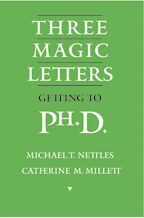
Michael T. Nettles and Catherine M. Millett
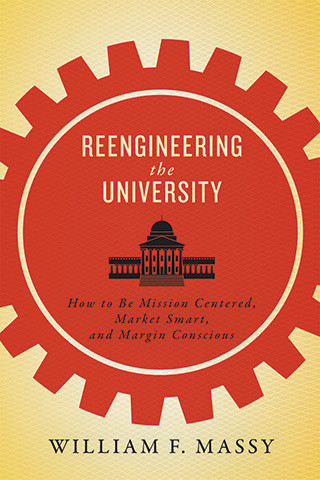
William F. Massy

edited by Rebecca Chopp, Susan Frost, and Daniel H. Weiss
Jennie C. Stephens
Doris Iarovici, MD
Just in time comes a new book that suggests a set of reforms and innovations meant to transform doctoral education into a more student-centered, career-diverse, socially engaged enterprise that enlarges the possibilities for students and expands the benefits for society.
Cassuto and Weisbuch remind us that all reform efforts have histories, including the one to reform US doctoral education. The New PhD recounts that history and presents a challenging set of options for the future. This book is a must-read, one to be argued with, embraced, refined, but not ignored.
Cassuto and Weisbuch's pointed, innovated analysis and tool box are much needed today. A true reform of graduate curricula has been long overdue. Generations to come will demand universities make changes now and will hold us accountable if we do not.
I found this book impossible to stop reading! It is terrific, full of ideas both practical and visionary. Buoyed by years of experience in the academy, Cassuto and Weisbuch design a doctoral education for the twenty-first century starting from the fundamental value of knowledge as a public good. Our students deserve an education that brings out the best of their talents, and this book lays out how to do it.
Cassuto and Weisbuch brilliantly harvest values, insights, and practices from graduate school reform around the country. I can't wait to share this inspiring book with colleagues, graduate students, and fellow project directors across the country. This book is vital and necessary—even more so in the wake of the COVID-19 pandemic.
Book Details
Introduction. Why We Need a New PhD and How We Can Create One Chapter 1. Then and Now: Two Recent Eras of Reform Chapter 2. Purpose, Then Path: A Practical Guide to Starting the Conversation Chapter 3
Introduction. Why We Need a New PhD and How We Can Create One Chapter 1. Then and Now: Two Recent Eras of Reform Chapter 2. Purpose, Then Path: A Practical Guide to Starting the Conversation Chapter 3. Career Diversity: A Liberal Arts Approach to the PhD Chapter 4. Admissions and Attrition Chapter 5. Student Support and Time to Degree Chapter 6. Curing the Curriculum and Examining the Exam Chapter 7. Advising Chapter 8. Students as Teachers Chapter 9. Degrees: What Should They Look Like? What Should They Do? Chapter 10. Public Scholarship: What It Is, Where It Came From, and What It Requires Conclusion. From Words to Actions Postscript Acknowledgments Notes Index
Leonard Cassuto
Robert weisbuch.
with Hopkins Press Books


- Education & Teaching
- Higher & Continuing Education

Download the free Kindle app and start reading Kindle books instantly on your smartphone, tablet, or computer - no Kindle device required .
Read instantly on your browser with Kindle for Web.
Using your mobile phone camera - scan the code below and download the Kindle app.

Image Unavailable

- To view this video download Flash Player

Follow the author

How to Get a Phd: A Handbook for Students and Their Supervisors 3rd Edition
There is a newer edition of this item:.

- ISBN-10 033520550X
- ISBN-13 978-0335205509
- Edition 3rd
- Publisher Open Univ Pr
- Publication date January 1, 2000
- Language English
- Dimensions 5.25 x 0.75 x 8.5 inches
- Print length 235 pages
- See all details

Editorial Reviews
About the author, product details.
- Publisher : Open Univ Pr; 3rd edition (January 1, 2000)
- Language : English
- Paperback : 235 pages
- ISBN-10 : 033520550X
- ISBN-13 : 978-0335205509
- Item Weight : 12.7 ounces
- Dimensions : 5.25 x 0.75 x 8.5 inches
- #51,229 in Education (Books)
- #58,051 in Higher & Continuing Education
- #362,588 in Unknown
About the author
Estelle phillips.
Discover more of the author’s books, see similar authors, read author blogs and more
Customer reviews
Customer Reviews, including Product Star Ratings help customers to learn more about the product and decide whether it is the right product for them.
To calculate the overall star rating and percentage breakdown by star, we don’t use a simple average. Instead, our system considers things like how recent a review is and if the reviewer bought the item on Amazon. It also analyzed reviews to verify trustworthiness.
- Sort reviews by Top reviews Most recent Top reviews
Top reviews from the United States
There was a problem filtering reviews right now. please try again later..
Top reviews from other countries
- Amazon Newsletter
- About Amazon
- Accessibility
- Sustainability
- Press Center
- Investor Relations
- Amazon Devices
- Amazon Science
- Start Selling with Amazon
- Sell apps on Amazon
- Supply to Amazon
- Protect & Build Your Brand
- Become an Affiliate
- Become a Delivery Driver
- Start a Package Delivery Business
- Advertise Your Products
- Self-Publish with Us
- Host an Amazon Hub
- › See More Ways to Make Money
- Amazon Visa
- Amazon Store Card
- Amazon Secured Card
- Amazon Business Card
- Shop with Points
- Credit Card Marketplace
- Reload Your Balance
- Amazon Currency Converter
- Your Account
- Your Orders
- Shipping Rates & Policies
- Amazon Prime
- Returns & Replacements
- Manage Your Content and Devices
- Recalls and Product Safety Alerts
- Conditions of Use
- Privacy Notice
- Your Ads Privacy Choices

How to use the PhD title and all the little doctorate “rules”
There are many conventions in the academic world that can make it difficult to navigate the PhD title. The PhD title is awarded to those who have completed a doctoral degree but, not many people know how to use it once they have it.
This article will go through everything you need to know about using the PhD title and when you can start using it.
The “rules” are relatively simple and can be broken as they are not officially set in stone – other than when you can officially call yourself a doctor.
There is no one correct answer but it may be misleading if you use the PhD title incorrectly. Here are the recommendations for effective communication.
It very much depends on the setting. Here are some examples of how I would use my PhD titles awarded to me after my PhD degree.
How do you Write PhD correctly after a name? Is it ph d or phd?
It can be confusing to know exactly how to write PhD after your name. Which bits are capitalised? Is there a ‘.’ In the middle?
When writing a name with a PhD after it, the correct way to do so is to use “PhD” or “Ph.D. or Ph.D”
Depending on the preference of the individual, either form can be used.
However, if the individual has a business card that states their degree in full, then the more formal “Doctor of Philosophy” should be used.
It is important to note that using “PhD” without any periods is incorrect; this abbreviation should only be used in informal contexts such as emails or text messages. I tend to use PhD in my YouTube videos and some people have pointed out that this is incorrect…
Following the individual’s preferred format will ensure that their name and credentials are properly represented.
Should you use Dr as well as PhD?
Some people like to use Dr and PhD in their official titles. There are a couple of important points that you need to know about markers and academic titles.
- A person can have more than one marker in their name. For example my full title is Dr Andrew Stapleton, PhD, MChem.
- The doctor title at the front can be used as a variant to the PhD at the end.
It can be a little bit ambiguous if I was to use Dr Andrew Stapleton, PhD as there are two markers. This could mean that I have two PhD’s, it could mean that I have a PhD and a medical doctorate, or it could just be that I want to use both the doctor and the PhD tags for the one degree.
However, in my experience, I still like to use the doctor title at the front and the PhD tag at the end of my name for official purposes.
Academics would rarely use the PhD suffix in everyday communication. They would much rather just use the doctor title.
What is the proper title for a PhD?
The proper title for a PhD is Doctor of Philosophy. However, some teachers and professors like to be referred to without their official title.
If you are not sure about how your professor, lecturer, or friend with a PhD wishes to be officially addressed you can ask them.
Most of the time, I like to refer to my colleagues with their doctor title for official purposes, but I do not include the PhD at the end of their name. That is much better suited to a business card.
Your lecture may wish to be referred to as:
- Dr [last name]
- Dr [first name]
Asking them in the early stages of your relationship is the best way to work out which one they prefer.
If in doubt, always go for the more formal name and nomenclature.

When can you start to use your PhD title after your doctorate?
When you have earned your PhD, you can start using your title immediately. Although, it can be a little bit confusing as to when you have actually passed your PhD. Is it when you have submitted your dissertation? Is it when you have received the comments back?
The University of Adelaide says that you can use it from your conferral date:
Students can be conferred on one of five dates during the year and for PhD students the conferral date will be the first available following the completion of all the academic requirements of your degree, including final thesis lodgement and the disbursement of any outstanding financial obligations to the University.
I started using my PhD title as soon as my confirmation letter arrived at my house. It was the first letter from the University that referred to me as Dr Stapleton. It was incredibly excited.
Generally, it is acceptable to use the title “Dr.” both professionally and socially but socially, people very rarely use it – at least in Australia. But you should never use it if you are a PhD student, PhD candidate or enrolled in a PhD program without a previous PhD qualification.
I do use it in professional settings but it always makes me feel a little bit awkward.
However, there may be some restrictions for certain settings. For example, if have a research degree resulting in a doctor title and you are working in a medical setting – some institutions do not like you to use Dr as it can confuse patients into thinking that you have a medical degree.
Instead, they ask that you use the PhD tag at the end of your name rather than the doctoral title for official and professional communications.
What is the correct way to write PhD?
When writing about someone’s PhD, the correct way is to write the term in full and capitalize each letter.
This should be done for all academic degrees, not just PhDs.
For example, it would be “Doctor of Philosophy” or “PhD” instead of “Ph.D.”, “Dr.”, or “DPhil”.
Additionally, it is common to mention the field of study in which the degree was earned if known, such as “Doctor of Philosophy in Mathematics”. It is also good practice to include the institution that granted the degree if it is a recognized one.
When writing about someone’s PhD, use proper capitalization and include relevant information like field of study and institution if known to ensure accuracy.
How do you put a PhD in a title?
Putting a PhD in a title is not as complicated as it may sound.
Generally speaking, the proper way to list a PhD in an academic or professional setting is by writing “Dr.” before the name, followed by the person’s full name and the appropriate abbreviations for their degree.
For example, if John Smith has earned a doctorate in psychology, his credentials would be listed as “Dr. John Smith, Ph.D.”
In some cases, such as when addressing someone formally in speech or on a business card, it may also be acceptable to list their credentials as “John Smith, Ph.D.”
Depending on context and personal preference, some people may also choose to list their higher degrees after their names by writing out the entire degree instead of just its abbreviation.
For example, John Smith could choose to write his full title as “John Smith, Doctor of Psychology”
However, I have not seen this in real academic life.
Should the font size of Ph.D. be the same as someone’s name?
The question of whether the font size of a Ph.D. should be the same as someone’s name is an interesting one.
On one hand, it could be argued that the Ph.D. deserves to be highlighted and therefore should be given a larger font size than someone’s name to denote its importance.
On the other, it could be argued that this would not be necessary or appropriate, and that treating everyone equally regardless of their title or degree is more important.
It depends on context and usage – if both names appear in the same document then they should likely have the same font size; however, if one appears in a formal setting such as a diploma or certificate, then it may make sense to give it a larger font size than someone’s name to emphasize its importance and significance.
Ph.Ds (or PhDs) are an important academic achievement and should be respected accordingly but without going overboard by giving them overly large fonts sizes which can take away from rather than add to their importance.
Wrapping up – doctoral title rules
this article has been over everything you need to know that using the PhD title properly and effectively.
The doctor title can be used in place of the PhD and for incredibly formal communications, such as a business email or card, you can use both.
However, sometimes using both can cause confusion as to whether or not there is a reason first using both the doctor and PhD tags. Nonetheless, many people still use both.

Dr Andrew Stapleton has a Masters and PhD in Chemistry from the UK and Australia. He has many years of research experience and has worked as a Postdoctoral Fellow and Associate at a number of Universities. Although having secured funding for his own research, he left academia to help others with his YouTube channel all about the inner workings of academia and how to make it work for you.
Thank you for visiting Academia Insider.
We are here to help you navigate Academia as painlessly as possible. We are supported by our readers and by visiting you are helping us earn a small amount through ads and affiliate revenue - Thank you!

2024 © Academia Insider

Learn Dunia
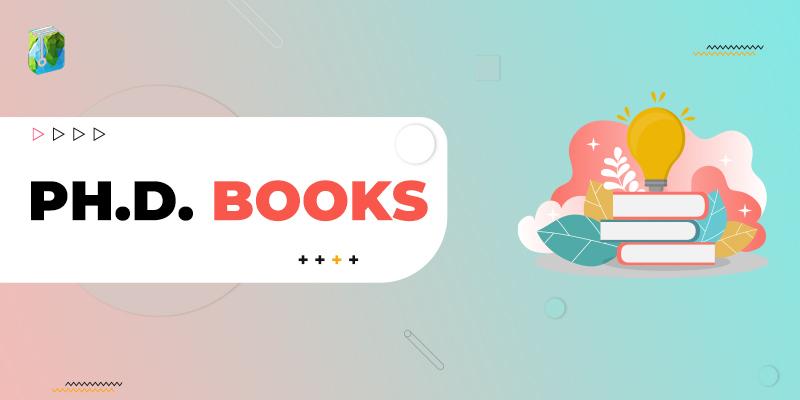
10 Best Ph.D Books For Students In 2024 [For Ph.D Students]
Here in this post, we have mentioned everything you need to know about Ph.D. and some of the best Ph.D. books for everyone pursuing a Ph.D. or planning to pursue this degree.
The Doctor of Philosophy or Ph.D. is the most popular and most extensive research program in various fields like Science, Engineering, Mass Communication, Management, Commerce, Law, etc. It is considered the most common and prestigious degree that aims to offer good academic jobs. Moreover, a Ph.D. is an earned research degree offered in diverse specializations.
To graduate with a Ph.D. degree, the students need to contribute some effective and original output and ideas in their field of interest. At the end of the program, the students must submit a Ph.D. thesis or dissertation. Their research will help to analyze their knowledge in the specific subject.
Why Should You Pursue a Ph.D.?
Ph.D. full form is Doctor of Philosophy. It is one of the highest degrees in the education domain. Once you complete the degree, it will be considered a greater accomplishment in the field of study. Moreover, this degree helps to analyze the research and analytical skills of the student.
This degree trains the students to improve their methodology, analytical, and research skills. Here are a few things you must know before you start pursuing your Ph.D.:
- The total Ph.D. course duration is a minimum of 3 years and a maximum of 5 years.
- Students need to have a postgraduate degree before applying for a Ph.D. degree.
- Students applying for Ph.D. need to score at least 55% in their post-graduation program to apply for a Ph.D.
- Students with work experience in the same area of interest can also apply for a Ph.D.
- Students who have cleared national entrance examinations like CSIR-UGC-NET, GATE , UGC-NET, and more can also apply for a Ph.D.
Now that you have a little idea about Ph.D., you must have known that it is a prestigious degree that will open doors for significant career options. If you wish to choose a Ph.D. as your career path, we are here to help you. In this article, you will find the 10 best Ph.D. books available.
So let us get started.
10 Best Ph.D. Books For Students In 2024
Here in this section, we have listed the 10 best Ph.D. books for everyone who is pursuing a Ph.D. or wants to pursue this course.
1. How to Get a Ph.D.: A Handbook for Students and Their Supervisors
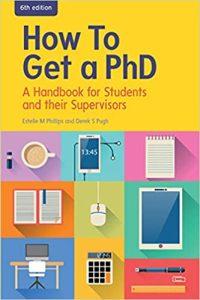
Author: Estelle Phillips, Derek Pugh Latest Edition: 16 August 2015 (6th Edition) Publisher: Open University Press
How to Get a Ph.D.: A Handbook for Students and their Supervisors is one of the best Ph.D. books that offers a practical and realistic approach to learning Ph.D. This book also offers extensive support and reassurance to the students and supervisors.
The newly updated 6th edition of the book includes:
- New content on how students pursuing a Ph.D. can use online forums, social media, various online survey tools, and other online technologies to make pursuing a Ph.D. easier.
- The 10th chapter explains some of the most common challenges you will face throughout your Ph.D. program. It includes some practical advice to help you deal with the pressure you will face while writing your thesis.
- The importance of avoiding plagiarism and avoiding poor academic practices. The authors also put light on all the problems faced by Ph.D. students.
- The book provides clear advice for Ph.D. students, including writing proposals, applying for funding, time management, writing an engaging Ph.D. thesis, and ways to ace your viva.
It is a “bible” for every Ph.D. student and supervisor looking for an extensive Ph.D. guide.
You can buy this book here .
2. PhD: An Uncommon Guide to Research, Writing & Ph.D. Life
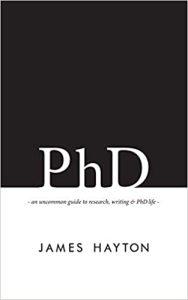
Author: James Hayton Latest Edition: 1 January 2015 Publisher: Zaccheus Entertainment
Ph.D.: An Uncommon Guide to Research, Writing & Ph.D. Life by James Hayton offers a unique approach to solving the most common challenges faced while doing the Ph.D. research.
It offers solutions to problems like getting familiar with the literature in your field, developing research ideas, and improving your academic writing skills. Moreover, it helps to cope with the stress, managing publications and presentations, writing, submitting, and defending your thesis.
This apt guide offers practical tips that help you become a better professional in your chosen field. The authors have written this book in a very simplified and understandable way. Moreover, if you are the one who feels you are not doing fine in your Ph.D. journey, this book will help you get over the work and study anxiety.
3. The Unwritten Rules of Ph.D. Research (Open Up Study Skills)
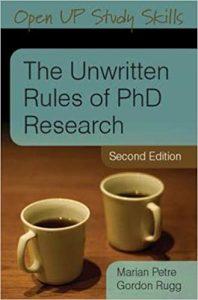
Author: Marian Petre, Gordon Rugg Latest Edition: 16 March 2010 (2nd Edition) Publisher: Open University Press
The Unwritten Rules of Ph.D. Research by Marian Petre and Gordon Rugg is a bestselling Ph.D. book that focuses on the P.hD. research process that provides the readers with discussions and guidance on various aspects of the course which other books do not focus.
This book covers all the important topics including the real meaning of Ph.D., how to do one well, how to understand what your supervisor is really expecting when they say “good referencing” and “real research questions.” The book also focuses on designing, reporting, and defending your research. In this Ph.D. book, the author explains the complete Ph.D. process in detail.
The new edition of this Ph.D. study material includes:
- Research skills
- Critical thinking
- Different study models
- The root to research independence
This book is a must-read for anyone who is planning to pursue Ph.D. or is already pursuing one. This book explains solutions to the problem that many students wish someone answered.
4. How to Write a Lot: A Practical Guide to Productive Academic Writing
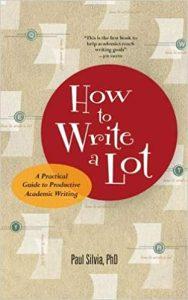
Author: Paul J Silvia Latest Edition: 1 January 2007 (1st edition) Publisher: American Psychological Association (APA)
How to Write a Lot: A Practical Guide to Productive Academic Writing is a practical, light-hearted, and encouraging Ph.D. book. In this book, the author explains that writing does not have to be an innate skill or a special skill one person has but it is all about knowing the tips and tricks to write good content.
He explains this with the help of his own experiences in the field of psychology. The author also teaches how to overcome motivational roadblocks and become motivated to write without having to sacrifice your evening, vacations, and weekends.
Apart from the strategies to write effectively, the author offers advice on submitting, revising, re-submitting articles, ways to improve the quality of your content, and steps to publish your academic work.
5. Authoring a Ph.D.: How to Plan, Draft, Write and Finish a Doctoral Thesis or Dissertation
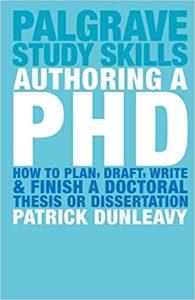
Author: Patrick Dunleavy Latest Edition: 28 April 2003 (1st Edition) Publisher: Palgrave Macmillan
We all know that Authoring a Ph.D. is a very time-consuming and complex process. To author a thesis, you need to have a bunch of creative ideas, plan and organize these ideas, write based on the plan, upgrade your content, and finish it with good quality.
Patrick has written this book after supervising over 30 students and offers full-proof advice which helps the students to cope up with both the intellectual issues and practical difficulties of organizing their work.
This book is a highly-readable and time-saving guide for students specializing in humanities, education, social sciences, business studies, arts, law, health, and other related disciplines.
6. AP Calculus Premium, 2024-2025: 12 Practice Tests + Comprehensive Review + Online Practice: With 12 Practice Tests
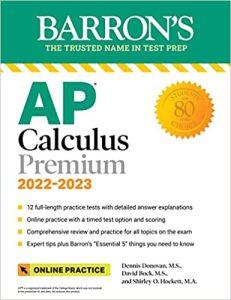
Authors: David Bock M.S., Dennis Donovan M.S., Shirley O. Hockett Ph.D. Latest Edition: 4 January 2022 (16th Edition) Publisher: Barron’s Educational Series
Barron’s AP Calculus Premium: 2024-2024 offers in-depth content review and online practice for the AB and BC examinations. Since this book is written by experienced educators, all the content is composed and reviewed by AP experts. The book offers tips, strategies, and some study advice for the examination day.
AP Calculus Premium includes:
- 12 full-length practice test papers: 6 AB practice tests, 6 BC practice tests.
- In-depth review that covers all units on the AP Calculus AB and BC Exams.
- Multiple Choice Questions after each chapter.
- Online timed test options
- Online detailed answer explanations and expert advice.
7. Writing Science: How to Write Papers That Get Cited and Proposals That Get Funded
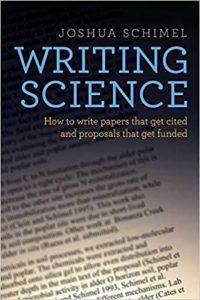
Author: Joshua Schimel Latest Edition: 12 March 2012 Publisher: OUP USA
Writing Science explains that successful science writing helps to tell a story. This is one of the Ph.D. books that explain how to write content more effectively. The author uses lessons from other genres of writing with those from the author’s experience as an author, editor, and reviewer.
The book shows scientists and students different ways to showcase their research more clearly and in a comprehensive way. It takes an integrated approach to discuss different aspects of successful science writing, the overall structure of the paper, every section paragraph, sentence, and words.
The book uses core arguments, then explains reasons why some of the stories are engaging than others. Then the author talks about the different elements of story structure. Writing science most focuses on the internal structure of the paper, explaining how to write clear and professional content that is very compelling to read.
The final section of this Ph.D. book deals with challenges like how to discuss research limitations and how to write effectively for the public.
8. A Mind for Numbers: How to Excel at Math and Science
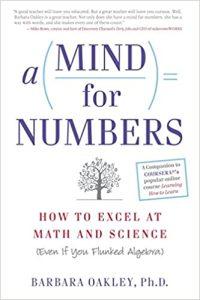
Author: Barbara Oakley Latest Edition: 31 July 2014 Publisher: TarcherPerigee
A Mind of Numbers is one of the Ph.D. books that offers various tools which will help you better in writing intimidating materials. Barbara Oakley, an engineering professor, knows the struggles we all face with maths.
Since she was also the one who flunked in maths during high school and during her graduation, she understood the need for a comprehensive maths guide that will help the Ph.D. students throughout.
In this book, the authors tell the secrets of learning effectively. The learning strategies mentioned in this book are not only for maths and science, in fact, it also applies to all the subjects that students might find difficult to learn.
9. Getting What You Came For: The Smart Student’s Guide to Earning an M.A. or a Ph.D.
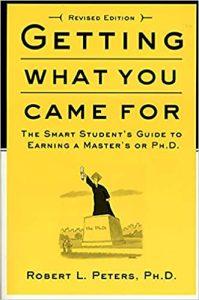
Author: Robert L. Peter Latest Edition: 11 April 1997 Publisher: Farrar, Straus & Giroux
Getting What You Came For by Robert Peters is one among the classic Ph.D. books that help students to answer some complex career questions like “is graduate school the right thing for you?”, “Should I get a master’s degree or a Ph.D.?”, “ways to choose the best school?”, and more.
Since this book has interviews with educational counselors, graduate students, and professions, it offers some real-life experiences and case studies that help the students to understand better.
It also teaches the students to not only survive but also thrive at a graduate school. This book also covers some instructions on applying to school and how to manage your finances. Moreover, this book also covers how to score good marks, manage academic politics, and write a high-quality thesis.
10. AP Statistics: With 6 Practice Tests (Barron’s Test Prep)
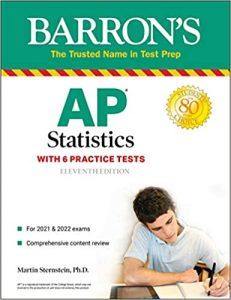
Author: Martin Sternstein Ph.D. Latest Edition: 4 August 2020 (11th Edition) Publisher: Barron’s Educational Series
Baron’s AP Statistics is all you need for preparing for the exam day. It includes all the in-depth content reviews and practice papers.
Since this book is written by experienced educators, all the content is written and reviewed by AP experts. The book offers tips, strategies, and some study advice for the examination day.
AP Statistics includes:
- 6 full-length practice test papers.
- In-depth review that covers all units of the subject.
- Online timed test options.
The Ph.D. is the most prestigious and extensive research program that offers specialization in different areas like mass communication, mathematics, management, law, commerce, engineering, and more.
To excel and graduate with good grades and to create the best thesis of all time, you need to have great study material which will guide you throughout the course. Here in this post, we have listed the 10 best Ph.D. books that will help you throughout the process of getting admissions to completing your thesis.
Happy Reading.
People are also reading
- Best Weight Loss Books
- Best Marketing Books
- Best CAT Books For CAT Examination
- Digital Marketing Books
- Best Motivational Books
- Best Branding Books
- Best Life Changing Books
- Best Copywriting Books
- Best Accounting Books
- Best Time Management Books
Leave a comment Cancel reply

PhD Book Depot
Book features.
PhD Book Depot offers books specifically designed for research scholars. These books have been developed keeping in mind the limited guidance available these days to PhD candidates.
Simple Language and Easy to Understand.
Complete coverage of research strata., methodical, step-by-step learning guides..

The PhD Start Up Guide
- Publisher : Jononi Publication
- Publish Date : October 18, 2016
- ISBN-10 : 0236547851
- ISBN-13 : 2547810321560
There are many sites where you can order your favorite book quote printed on a poster, mug, t-shirt, and tens of other products.Below you’ll find our recommendations – the sites that offer high-quality book quote designs on a large selection of items.....
We list of books is growing every month. Keep coming back to check for the latest titles.
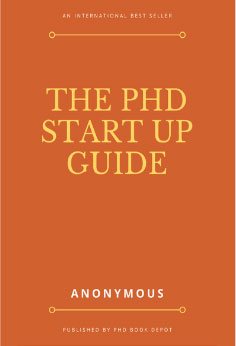
our Reader Says
PhD Made Simple
Venugopal R.
I opted for the PhD Start Up Guide Initially and liked the practical usage of the book. Slowly I ordered four more titles from PhD Book Depot and I found all them useful for my PhD. I recommend these books to all PhD candidates as they help you in understand research and build your confidence.
Website Designed by 360WebsiteDesign
Enquire About PhD Books

How to Correctly Use the Titles Dr. & PhD With a Name

How to Reference a Person With a PhD
When someone has earned a Doctor of Philosophy, or Ph.D., degree, that person is subsequently referred to as “doctor” in formal speech. The same is true of a person who is a medical doctor, psychologist, dentist or veterinarian. In formal speech, that person should be referred to as “doctor.” However, the rules are different in written form when addressing someone who is called “doctor” in formal speech. In written form, the titles “Dr.” and “Ph.D.” are not interchangeable.
Determine the Type of Doctor
First, you should identify what type of doctor you are addressing. Doctors of medicine and psychology, doctors of dentistry and doctors of veterinary medicine must be addressed differently in comparison to academic doctors who have earned a Doctor of Philosophy doctoral degree. Be advised that there are different types of doctoral degrees. A Doctor of Philosophy degree is just one kind of doctoral degree. There’s also, for example, a Doctor of Education doctoral degree and a Doctor of Psychology doctoral degree. The titles associated with the various doctoral degrees are not interchangeable. Only a person who has earned a Doctor of Philosophy degree should be addressed as Ph.D.
Addressing a Doctor in Writing
Place the title of “Dr.” before the name of a person who is a doctor of medicine or psychology, doctor of dentistry, or doctor of veterinary medicine. For example Dr. George Ross. Always write the word “doctor” in its abbreviated form when it goes before the person’s name. Never write, for example, Doctor George Ross. Do not combine the title of “Dr.” with any other title even if the person could appropriately be addressed by a different title. Never write, for example, “Dr. George Ross, Ph.D.,” even if the person is a medical doctor who has also earned a Doctor of Philosophy degree. Pick one title. Do not use the “Dr.” title when referring to someone who is solely an academic doctor.
Put a comma followed by the title “Ph.D.” after the name of a person who has earned a Doctor of Philosophy doctoral degree. For example Stacey Childs, Ph.D. Do not combine the title of “Ph.D.” with any other title even if the person could appropriately be addressed by a different title. For instance, even if the person being addressed is a doctor of medicine who has also earned a Ph.D., never write, for example, Dr. Stacey Childs, Ph.D. Pick one title. Do not use the “Ph.D.” title when referring to someone who not earned a Doctor of Philosophy doctoral degree.
Related Articles
How to sign your name when you have a bachelor of science in criminal ....

Proper Way to Notate College Degrees

How to Address a DVM

Different Types of Doctoral Degrees

How to Address Multiple Ladies in a Letter

The Difference Between a Doctoral Degree and a Ph.D.

The Difference Between a PhD & DLitt

Doctorate Degrees That Don't Require a Dissertation
- The Emily Post Institute: What are some professional titles to know?
Maya Austen began freelance writing in 2009. She has written for many online publications on a wide variety of topics ranging from physical fitness to amateur astronomy. She's also an author and e-book publisher. Austen has a Bachelor of Arts in communications from the New England Institute of Art and currently lives in Boston, Mass.
Thank you for visiting nature.com. You are using a browser version with limited support for CSS. To obtain the best experience, we recommend you use a more up to date browser (or turn off compatibility mode in Internet Explorer). In the meantime, to ensure continued support, we are displaying the site without styles and JavaScript.
- View all journals
- Explore content
- About the journal
- Publish with us
- Sign up for alerts
- 12 March 2024
Bring PhD assessment into the twenty-first century
You have full access to this article via your institution.

Innovation in PhD education has not reached how doctoral degrees are assessed. Credit: Dan Dunkley/Science Photo Library
Research and teaching in today’s universities are unrecognizable compared with what they were in the early nineteenth century, when Germany and later France gave the world the modern research doctorate. And yet significant aspects of the process of acquiring and assessing a doctorate have remained remarkably constant. A minimum of three years of independent study mentored by a single individual culminates in the production of the doctoral thesis — often a magisterial, book-length piece of work that is assessed in an oral examination by a few senior academic researchers. In an age in which there is much research-informed innovation in teaching and learning, the assessment of the doctoral thesis represents a curious throwback that is seemingly impervious to meaningful reform.
But reform is needed. Some doctoral candidates perceive the current assessment system to lack transparency, and examiners report concerns of falling standards ( G. Houston A Study of the PhD Examination: Process, Attributes and Outcomes . PhD thesis, Oxford Univ.; 2018 ). Making the qualification more structured would help — and, equally importantly, would bring the assessment of PhD education in line with education across the board. PhD candidates with experience of modern assessment methods will become better researchers, wherever they work. Indeed, most will not be working in universities: the majority of PhD holders find employment outside academia.

Collection: Career resources for PhD students
It’s not that PhD training is completely stuck in the nineteenth century. Today’s doctoral candidates can choose from a range of pathways. Professional doctorates, often used in engineering, are jointly supervised by an employer and an academic, and are aimed at solving industry-based problems. Another innovation is PhD by publication, in which, instead of a final thesis on one or more research questions, the criterion for an award is a minimum number of papers published or accepted for publication. In some countries, doctoral students are increasingly being trained in cohorts, with the aim of providing a less isolating experience than that offered by the conventional supervisor–student relationship. PhD candidates are also encouraged to acquire transferable skills — for example, in data analysis, public engagement, project management or business, economics and finance. The value of such training would be even greater if these skills were to be formally assessed alongside a dissertation rather than seen as optional.
And yet, most PhDs are still assessed after the production of a final dissertation, according to a format that, at its core, has not changed for at least half a century, as speakers and delegates noted at an event in London last month on PhD assessment, organized by the Society for Research in Higher Educatio n. Innovations in assessment that are common at other levels of education are struggling to find their way into the conventional doctoral programme.
Take the concept of learning objectives. Intended to aid consistency, fairness and transparency, learning objectives are a summary of what a student is expected to know and how they will be assessed, and are given at the start of a course of study. Part of the ambition is also to help tutors to keep track of their students’ learning and take remedial action before it is too late.

PhD training is no longer fit for purpose — it needs reform now
Formative assessment is another practice that has yet to find its way into PhD assessment consistently. Here, a tutor evaluates a student’s progress at the mid-point of a course and gives feedback or guidance on what students need to do to improve ahead of their final, or summative, assessment. It is not that these methods are absent from modern PhDs; a conscientious supervisor will not leave candidates to sink or swim until the last day. But at many institutions, such approaches are not required of PhD supervisors.
Part of the difficulty is that PhD training is carried out in research departments by people who do not need to have teaching qualifications or awareness of innovations based on education research. Supervisors shouldn’t just be experts in their field, they should also know how best to convey that subject knowledge — along with knowledge of research methods — to their students.
It is probably not possible for universities to require all doctoral supervisors to have teaching qualifications. But there are smaller changes that can be made. At a minimum, doctoral supervisors should take the time to engage with the research that exists in the field of PhD education, and how it can apply to their interactions with students.
There can be no one-size-fits-all solution to improving how a PhD is assessed, because different subjects often have bespoke needs and practices ( P. Denicolo Qual. Assur. Educ. 11 , 84–91; 2003 ). But supervisors and representatives of individual subject communities must continue to discuss what is most appropriate for their disciplines.
All things considered, there is benefit to adopting a more structured approach to PhD assessment. It is high time that PhD education caught up with changes that are now mainstream at most other levels of education. That must start with a closer partnership between education researchers, PhD supervisors and organizers of doctoral-training programmes in universities. This partnership will benefit everyone — PhD supervisors and doctoral students coming into the research workforce, whether in universities or elsewhere.
Education and training in research has entered many secondary schools, along with undergraduate teaching, which is a good thing. In the spirit of mutual learning, research doctoral supervisors, too, will benefit by going back to school.
Nature 627 , 244 (2024)
doi: https://doi.org/10.1038/d41586-024-00718-0
Reprints and permissions
Related Articles

- Scientific community

‘Woah, this is affecting me’: why I’m fighting racial inequality in prostate-cancer research
Career Q&A 20 MAR 24

So … you’ve been hacked
Technology Feature 19 MAR 24

Four years on: the career costs for scientists battling long COVID
Career Feature 18 MAR 24
‘Global swimways’ on free-flowing rivers will protect key migratory fish species
Correspondence 19 MAR 24

How to stop ‘passing the harasser’: universities urged to join information-sharing scheme
News 18 MAR 24

Take these steps to accelerate the path to gender equity in health sciences
Nature Index 13 MAR 24

Is AI ready to mass-produce lay summaries of research articles?
Nature Index 20 MAR 24

Are we in the Anthropocene yet?
Editorial 20 MAR 24
Global Talent Recruitment of Xinxiang Medical University in 2024
Top-notch talents, leading talents in science and technology, and young and middle-aged outstanding talents.
Xinxiang, Henan, China
Xinxiang Medical University
Postdoctoral Scholar-Lab Animal Care Unit
Memphis, Tennessee
The University of Tennessee Health Science Center (UTHSC)
Experimental Postdoctoral Fellows in Cancer Biology/Immunology
Experimental postdoctoral fellows in cancer biology/immunology
Houston, Texas (US)
The University of Texas MD Anderson Cancer Center
Postdoctoral fellow
The position focuses on the use of hematopoietic stem and progenitor cells (HSPCs) and gene therapy for neurodegenerative disorders.
Cherqui Lab, UCSD, La Jolla
Univesity of California, San Diego
Senior Research Scientist
MSK is seeking an experienced Scientist to join their NIH funded laboratory dedicated to gene target identification and drug discovery in soft tissue
New York (US)
Memorial Sloan Kettering Cancer Center (MSK)
Sign up for the Nature Briefing newsletter — what matters in science, free to your inbox daily.
Quick links
- Explore articles by subject
- Guide to authors
- Editorial policies
Nebraska lawmaker faces calls to resign after invoking colleague's name in book's rape scene passage
Republican Nebraska state Sen. Steve Halloran faces calls to resign after he insert ed a colleague's name into a passage he read during a floor debate from a book's rape scene, which included graphic detail.
Halloran apologized on the Senate floor Tuesday morning, defending his decision to read the passage but saying it was a "mistake" to refer to his colleagues.
"I apologize for interjecting the senators' names in the middle of reading a transcription, transcribed testimony in a public hearing, in reference to a book that is in some schools and, in some schools, required reading," he said. "It was a hard thing to read. And no, I was not trivializing rape. I was reading from a book that’s required reading for some students. Should I have interjected the senators' names? No. Sometimes we do things on the floor in the midst of making a statement that we shouldn’t have done."
Halloran made the remarks under scrutiny during a debate Monday over Legislative Bill 441 , which targets obscenity and pornography in K-12 schools.
Halloran was reading from Alice Sebold's memoir, "Lucky," in which she described being raped in college, and he repeatedly invoked "Sen. Cavanaugh" as he read directly from the passage describing the incident of sexual violence. He didn't specify whether he was referring to state Sen. Machaela Cavanaugh or her brother, state Sen. John Cavanaugh, both Democrats. In his apology Tuesday, Halloran said his comments were initially directed at John Cavanaugh, who had spoken before him.
Machaela Cavanaugh lashed out at Halloran later Monday in emotional comments on the floor. "You don't know anything about anyone else's life. And I can tell you that women in this body have been subjected to sexual violence," she said. She said Tuesday that she did not believe he was referring to her brother.
Reached for comment Tuesday, Machaela Cavanaugh's office responded with a statement from the senator that said Halloran "violated the integrity of our non-partisan legislative body by reading excerpts from a book written about a sexual assault victim."
"But he didn’t stop there," she said. "He verbally spat in the face of sexual assault victims across the state and the country by inserting my name in between phrases of obscenity. It’s beneath him. It’s beneath his title. So let me say this: Senator Steve Halloran should be held accountable.”
Halloran did not respond to a request for comment.
Sen. Megan Hunt, an independent, adjourned the session early Monday because of Halloran’s remarks.
“Honestly, I think Halloran should resign. How dare he even form his mouth to say the words 'Give me a b--- j-- Senator Cavanaugh,'” she wrote on X. “He said that because he wanted to say it. It was beyond the pale. Pure aggression to read a rape scene out loud and put it like that. Broken brain.”
“The problem isn’t that graphic language exists in books,” she added in another post. “The problem isn’t that rape survivors have written about their experiences. The problem is standing on a platform as a state senator, and fixing your mouth to tell one of your colleagues to give you a b--- j--.”
Republican Sen. Julie Slama, the youngest member of the chamber, spoke on the floor after Halloran apologized. She said Halloran’s remarks Monday were “wholly inappropriate” and called on him to resign . She also called on the chamber to implement stronger protections for lawmakers against misconduct.
“I don’t care if it was John Cavanaugh; I don’t care if it was Machaela Cavanaugh,” she said. “It doesn’t matter the gender of the person you are trying to sexually harass.”
Sen. Brad von Gillern, a Republican, denounced Halloran's remarks and his "conditional apology" in an emotional speech on the floor Tuesday. Through tears, he said that as both a man and the father of a rape victim, he felt it was important to speak up. "I could not help but take it personally," he said.
The sponsor of the bill, Republican Sen. Joni Albrecht, apologized to her colleagues Monday.
"I'm so sorry that your name was injected into it," she said. "That is absolutely — I will be the first to stand up and say I'm sorry. This is in our schools. This is what's going on. And I don't want to see this elevated to any level."
In memoir from 1999, Sebold recounted surviving being raped in college. The man she accused, Anthony J. Broadwater, was wrongfully convicted and served 16 years in prison. He was exonerated in 2021 , and Sebold said she was "truly sorry" for playing a role in his conviction.
John Cavanaugh, in a statement Tuesday, said that Halloran "misses the point" and that advocates "for book banning would benefit from reading the books they seek to ban."
"Books that tell stories different from our own experiences teach us empathy and help us understand the experiences of other people," he said. “If he actually read this book he maybe would understand how his conduct has affected his colleges and fellow Nebraskans."
Rebecca Shabad is a politics reporter for NBC News based in Washington.

Lawmaker apologizes after inserting colleague’s name into book rape scene
Nebraska state Sen. Steve Halloran apologized Tuesday for reading a sexually graphic passage during debate over an obscenity bill and inserting a colleague’s name into the text — a moment that sparked widespread outrage and calls for his resignation from across the political spectrum.
The Republican lawmaker had addressed his remarks on Monday to “Senator Cavanaughs,” referring to the sibling Democrats Machaela and John Cavanaugh, and then began reading the description of a rape in the memoir “Lucky.” As he did, however, he substituted “Senator Cavanaugh” in the passage. At one point, he said it directly after a character asks for a graphic sexual act.
Halloran, 75, claimed in his apology that he was directing his remarks toward Sen. John Cavanaugh and another legislator, who had spoken out on the constitutional questions raised in the bill.
“I was not trivializing rape,” he said. “Should I have interjected the senators’ names? No. Sometimes we do things on the floor in the midst of making a statement we shouldn’t have done.”
Sen. Machaela Cavanaugh, 45, addressed the chamber in tears on Monday, describing the incident as harassment and “unbecoming of [Halloran] and unbecoming of this body.” She said she had “done nothing but try to have a respectful debate” about the bill, which seeks to prevent teachers and librarians from sharing “obscene” material even for educational purposes.
“That was so out of line and unnecessary and disgusting to say my name over and over again like that,” she continued, noting that there are women legislators who have experienced sexual violence.
Cavanaugh did not respond to calls and emails requesting comment on Tuesday.
Last year, the two-term senator slowed the legislature’s work to a near standstill for several weeks when she engaged in a filibuster to protest a measure to restrict medical treatment for transgender youths. “I will burn the session to the ground over this bill,” she vowed .
She eventually backed off, and legislators passed a bill in May to ban gender-affirming care for minors.
The latest controversy comes as law enforcement and election officials have warned that violent political rhetoric could have real-world ramifications this election season. Donald Trump, the presumptive Republican presidential nominee, said last weekend that there would be a “bloodbath” if he is not elected to a second term in November. Days earlier in Kansas, Republicans were castigated for holding a fundraiser where guests kicked and hit an effigy of President Biden.
Nebraska has a single-chamber legislature, with 32 registered Republicans and 17 registered Democrats serving in its Senate. This unicameral body governed for decades with relative bipartisanship, according to Kevin Smith, a professor of political science at the University of Nebraska at Lincoln, and it was not unusual to see members of opposition parties helming major committees.
But in recent years, as the national political discourse has become more vitriolic, the legislature has grown more divided as well, Smith said.
“What we’ve been seeing steadily over the past decade or more is the nationalization of state politics and the ideological polarization that accompanies it,” he noted Tuesday. “It’s pretty open conflict now, isn’t it?”
Smith said that lingering tensions over Machaela Cavanaugh’s strong stance against the law banning gender-affirming care may have had “some emotional spillover” in this week’s debate over the obscenity measure.
After Halloran’s widely condemned reading, state Sens. Megan Hunt (I) and Julie Slama (R) publicly called for his resignation on the social platform X. Hunt said it was “pure aggression to read a rape scene out loud and put it like that.”
Precious McKesson, executive director of the Nebraska Democratic Party, labeled the incident “ unacceptable ” on X and also urged Halloran to “resign now.”
Halloran’s office referred to his statement from the floor Tuesday when asked for a comment.
At the time of the incident, lawmakers were discussing Legislative Bill 441 , which would remove an exception to the state’s obscenity law for teachers and librarians in non-postsecondary educational settings who are sharing material for educational purposes. The bill describes “obscene” as work that appeals to the “prurient interest” or describes sexual conduct in an offensive way and “lacks serious literary, artistic, political or scientific value.” Opponents of the bill say it threatens teachers and librarians so they don’t put certain books on their shelves.
The bill comes amid a surge in attempted restrictions on reading materials in schools and libraries across the United States. In 2023, there was a 65 percent increase in titles targeted for censorship from 2022, the American Library Association reported last week.
“Lucky” was the 42nd most banned book in the United States during the 2021-22 school year, according to PEN America, the free expression group.
The bill’s sponsor, Sen. Joni Albrecht (R), apologized to Cavanaugh in the chamber. “I was mortified that you — whether your name was put in it, it was not right,” she said and went on to use the incident as an example of why such materials should not be allowed in schools. “I’m sorry that we even have to read anything like this,” she said.
The memoir, which tells author Alice Sebold’s story of being raped during her freshman year of college, has faced its own controversy and questions over the author’s version of events. Anthony Broadwater, who was convicted of Sebold’s sexual assault in 1981, was exonerated in 2021 after spending 16 years in prison and years on the sex offender registry, prompting the book’s publisher to stop distributing it.
In a commentary for WBUR last year, Boston University associate professor Joshua Pederson said the book offers “a vital perspective both on the trauma of rape and on the still-unfolding sexual assault crisis on our campuses.” He wrote that “Lucky” remains important despite the controversy, which reflects flaws in the judicial system and challenges the urge for “clear-cut ideas about trauma and victimization.”
Sen. John Cavanaugh said Halloran “missed the point” in the remarks he gave on the floor. “There are graphic scenes in books. There are graphic things that happen to people in life, and stories have context, and they give meaning to the people who read them, who feel alone,” Cavanaugh said.
“The whole point,” he added, “is that we cannot make a determination writ large about what has value and to whom it has value.”
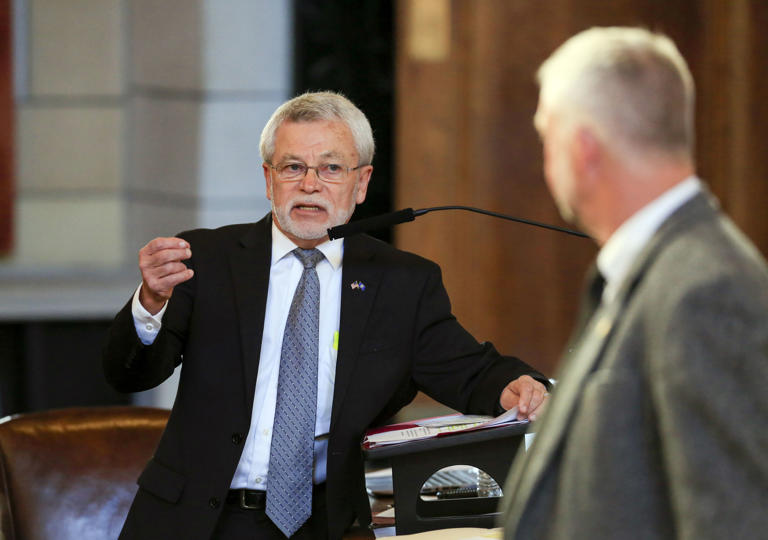
- Share full article
Advertisement
Supported by
A Nebraska Lawmaker Incites Outrage Over the Reading of a Book’s Rape Scene
The lawmaker, State Senator Steve Halloran, was criticized by both Republicans and Democrats for referring to two Democrats as he read the passage on the floor of the Capitol.

By Maya King
A Republican state lawmaker in Nebraska wanted to make a point about explicit content in school-sanctioned books. But his decision to name two Democrats during his reading of a graphic rape scene has led to calls for his resignation.
During a debate on Monday about legislation that would tighten restrictions on the content of books used in schools, the lawmaker, State Senator Steve Halloran, read a passage from a book that he said could be found in more than a dozen public libraries across the state.
The passage from the book, the Alice Sebold memoir “Lucky,” described a sexual assault she experienced as a young woman. After giving a brief warning and asking parents to tell their young children to leave the room or mute the broadcast if they were watching online, Mr. Halloran stood on the floor of the State Capitol in Lincoln and interjected the names of two of his Democratic colleagues — Machaela Cavanaugh and her brother, John — into the text as he read it aloud.
At one point, he inserted “Senator Cavanaugh” while reading a section in which Ms. Sebold described a man demanding oral sex from her. It was not clear if Mr. Halloran was referring to Mr. or Ms. Cavanaugh.
Shortly after Mr. Halloran finished reading the passage with his interjections, Ms. Cavanaugh responded, tearfully calling his altering of the passage unnecessary harassment that diminished the integrity of the legislation they were debating.
“Let’s have a real conversation,” she said to Mr. Halloran. “But don’t start reading rape scenes and saying my name over and over again. You don’t know anything about anyone else’s life and I can tell you that women in this body have been subject to sexual violence. I didn’t know you were capable of such cruelty.”
Afterward, lawmakers adjourned the session early. Ms. Cavanaugh also posted about the incident on X , calling it “gross, disrespectful and beneath the Nebraska Unicameral.”
In an interview, Ms. Cavanaugh said she was shocked when she heard Mr. Halloran say her last name.
“I think we have gotten into a place in our state and our country where we have this really hyperbolic rhetoric and it’s become normalized,” she said. “I do appreciate that, in this instance, people are not acting like this is normal.”
Mr. Halloran apologized in a speech at the Capitol on Tuesday morning. But he also defended his remarks, saying that he did not intend to “trivialize” sexual assault and that he wanted to draw attention to graphic content being read in schools. He added that his comments were initially directed at Mr. Cavanaugh. He said the names of Mr. Cavanaugh and his sister, he argued on Tuesday, because he felt that they were not paying attention as he was speaking.
“I apologize for interjecting senators’ names in the middle of reading a transcription — a transcribed testimony in a public hearing in reference to a book that is, in some schools, required reading,” Mr. Halloran said.
He added, “Should I have interjected the senators’ names? No. Sometimes we do things on the floor in the midst of making a statement that we shouldn’t have done.”
In an interview on Tuesday evening, Mr. Cavanaugh called Mr. Halloran’s remarks “aggressive,” but said the substance of his apology was what mattered.
“Whether directed at me or her, it impacted everyone who was there to see it,” he said of Mr. Halloran’s reading, adding, “He hurt people’s feelings.”
A handful of Nebraska state lawmakers quickly condemned Mr. Halloran’s remarks. One Republican state senator, Julie Slama, called for Mr. Halloran to resign. On Tuesday, a group of protesters repeated those calls in demonstrations outside his office in the State Capitol.
“Interjecting a colleague’s name is so far beyond the line of decency for any professional workplace,” Ms. Slama said in an interview. She called his apology “one of the most halfhearted, ingenuine apologies I’ve ever seen.”
Mr. Halloran did not respond to requests for comment.
Mr. Halloran, the former president of the National Farmers Organization, a farmer lobbying group, has served in the state legislature since 2016.
During his tenure, he has largely aligned himself with the far-right flank of Nebraska politics, particularly on issues of education. In 2017, he was one of a handful of senators to oppose a legislative amendment that would require schools to accommodate students who were breastfeeding. Later that year, a confrontation unfolded at the University of Nebraska at Lincoln between a lecturer and a student involved with Turning Point USA, a conservative student group. Mr. Halloran sided with the student and said that the university was hostile to conservatives on its campus.
State Senator John Arch, a Republican who is the speaker of the legislature, apologized to Ms. Cavanaugh and to the body’s female lawmakers on Tuesday, calling for more civility and “wisdom” in debating legislation.
“I do not condone the reading of the graphic rape scene on the floor of the legislature nor do I condone personally directing that passage to another member or members of this legislature, even if it is to make a point,” Mr. Arch said. “Despite the R-rated warning, we do not know who is on the other side of the television screen watching and listening — certainly children that this bill is directed to protect, not to mention survivors of sexual assault.”
Ms. Cavanaugh said she has not had a conversation with Mr. Halloran since he gave the reading, adding that she did not find his apology genuine. She said she does not plan to formally call for him to leave office, but said that she was not opposed to the push by her colleagues to oust him.
“I think that he has exhibited a pattern of behavior not in just in this instance but in other instances that show that he has a great deal of disrespect for people who do not agree with him and people who are female,” she said. “And I find it concerning. And I would not be sad to see him go.”
Maya King is a politics reporter covering the Southeast, based in Atlanta. She covers campaigns, elections and movements in the American South, as well as national trends relating to Black voters and young people. More about Maya King

IMAGES
VIDEO
COMMENTS
The 16 best phd degree books, such as By Degrees, Engineering Your PhD, Journey to the Ph.D. and Tomorrow's Professor. Categories Experts Newsletter ... Poland, with a triple MS title in Physics, Mathematics, and Psychology. Thereafter, she obtained a PhD in Computational Neuroscience at the Donders Institute for Brain, Cognition, and Behavior ...
The Professor Is In: The Essential Guide To Turning Your Ph.D. Into a Job (Paperback) by. Karen Kelsky. (shelved 25 times as phd) avg rating 4.16 — 1,879 ratings — published 2015. Want to Read. Rate this book. 1 of 5 stars 2 of 5 stars 3 of 5 stars 4 of 5 stars 5 of 5 stars.
A list of the best-selling phd degree books of all time, such as Tomorrow's Professor and Journey to the Ph.D..
A Europe-based computational scientist turned entrepreneur, Dr. Bielczyk offers an important perspective on PhD careers, one explicitly aimed at STEM folks. The book benefits from Bileczyk's personal experiences, extensive research — including interviews with dozens of PhDs — and includes lots of specific advice and suggestions.
7. Naturalistic Inquiry, 1st Edition. If your research topic is based on the field of social science, then this is a top book for Ph.D. students. For one thing, it challenges traditional approaches and proposes more progressive and accurate forms of study.
Reading some expert guide books will expand your knowledge and pave the way for the rigorous work ahead. Capella University faculty, doctoral students, and alumni recommend these five books for doctoral students in any discipline. 1. How to Read a Book: The Classic Guide to Intelligent Reading by Mortimer J. Adler.
By Alex Wakeman. Let's be honest. If you're nerdy enough to be doing a PhD, you probably love a good book. Whether you're looking for entertainment or advice, distraction or comfort, the seven listed here can each, in their own way, help you through your frustrating but uniquely rewarding life of a PhD student. Isaac Asimov - I, Robot.
Details. Author Merle van den Akker. Publisher World Scientific Publishing Company. Publication Date 2023-03. Section College Guides. Type New. Format Paperback. ISBN 9781800613645. Have you ever considered doing a PhD, but have no idea where to start?
This bestselling book guides PhD students through their graduate years and beyond. Filled with practical advice on getting started, communicating with your supervisor, staying the course, and planning for the future, this book is an indispensable guide for graduate students who need that extra bit of help getting started and making it through.
A unique take on how to survive and thrive in the process your PhD, this is a book that stands out from the crowd of traditional PhD guides. Compiled by a leading UK researcher, and written in a highly personal one-to-one manner, How to Get Your PhD showcases the thoughts of diverse and distinguished minds hailing from the UK, EU, and beyond, spanning both academia and industry.
This book examines the failed graduate school reforms of the past and presents a plan for a practical and sustainable PhD. For too many students, today's PhD is a bridge to nowhere. Imagine an entering cohort of eight doctoral students. By current statistics, four of the eight—50%!—will not complete the degree.
Take a look at The PhD Viva: How to Prepare for Your Oral Examination by Peter Smith. There are lots of great books out there about the viva. However, Peter Smith's extensive experience puts his at the top of our list. Having sat in over 100 viva examinations as a chair, examiner and supervisor in a range of subjects it's safe to say that ...
This book fills your learning toolkit on how to learn about an area quickly. New graduate students will find Young's book useful in supporting multiple methods and styles of learning. Graduate students and Ph.D. students need to read and retain lots of information and apply new techniques to problems. This book has discreet tips on doing this ...
The Ph.D. Process offers the essential guidance that students in the biological and physical sciences need to get the most out of their years in graduate school. Drawing upon the insights of numerous current and former graduate students, this book presents a rich portrayal of the intellectual and emotional challenges inherent in becoming a scientist, and offers the informed, practical advice a ...
A fantastic book that has completely changed how I view the PhD process: lots of clear guidance from the authors on how, and how not to get a PhD. Being a part-time PhD student means you miss out on so much of the networking and other help you would otherwise get (it's no surprise that 70% of part-time students fail to submit).
If you want a bit more of the conceptual basis behind the book, read this earlier post on why a thesis is a bit like an avatar. 4. The unwritten rules of PhD research by Marian Petre and Gordon Rugg. I love this book because it recognises the social complexities of doing a PhD, without ever becoming maudlin.
A person can have more than one marker in their name. For example my full title is Dr Andrew Stapleton, PhD, MChem. The doctor title at the front can be used as a variant to the PhD at the end. It can be a little bit ambiguous if I was to use Dr Andrew Stapleton, PhD as there are two markers. This could mean that I have two PhD's, it could ...
Using parts of a PhD thesis in a book requires that ongoing and/or collaborative research is being conducted. A book (perhaps co-authored) should be greater than the sum of its constituent parts. Using an aspect of a PhD thesis in an edited book on a broader topic ensures that the research fits with related research on a similar theme.
This book is a must-read for anyone who is planning to pursue Ph.D. or is already pursuing one. This book explains solutions to the problem that many students wish someone answered. You can buy this book here. 4. How to Write a Lot: A Practical Guide to Productive Academic Writing. Author: Paul J Silvia Latest Edition: 1 January 2007 (1st edition)
Expanded material on avoiding plagiarism and poor academic practice and increased coverage of issues faced by part-time PhD students ; The book retains its focus on delivering clear and practical advice, including tips for writing proposals and applying for funding, managing your time, writing an engaging PhD, and handling the viva. ...
The PhD Start Up Guide. Publisher : Jononi Publication. Publish Date : October 18, 2016. ISBN-10 : 0236547851. ISBN-13 : 2547810321560. There are many sites where you can order your favorite book quote printed on a poster, mug, t-shirt, and tens of other products.Below you'll find our recommendations - the sites that offer high-quality book ...
Books Advanced Search New Releases & Pre-orders Best Sellers Browse Genres Children's & Young Adult Textbooks Exam Central All Indian Languages 1-16 of 391 results. Results. Internal Family Systems Skills Training Manual: Trauma-Informed Treatment for Anxiety, Depression, Ptsd & Substance Abuse ... by Ann F. Haynos PhD, Evan M. Forman, et al ...
Put a comma followed by the title "Ph.D." after the name of a person who has earned a Doctor of Philosophy doctoral degree. For example Stacey Childs, Ph.D. Do not combine the title of "Ph.D." with any other title even if the person could appropriately be addressed by a different title. For instance, even if the person being addressed ...
PhD candidates are also encouraged to acquire transferable skills — for example, in data analysis, public engagement, project management or business, economics and finance.
As "The House of Hidden Meanings" is RuPaul's fourth book and his first straightforward memoir, it's understandably being marketed as an opportunity to see the pop culture icon in a new light.
Republican Nebraska state Sen. Steve Halloran faces calls to resign after he inserted a colleague's name into a passage he read during a floor debate from a book's rape scene, which included ...
"Lucky" was the 42nd most banned book in the United States during the 2021-22 school year, according to PEN America, the free expression group. The bill's sponsor, Sen. Joni Albrecht (R ...
A Republican state lawmaker in Nebraska wanted to make a point about explicit content in school-sanctioned books. But his decision to name two Democrats during his reading of a graphic rape scene ...